小学英语总复习的大量资料[1]
小学英语总复习资料完整版

小学英语总复习资料完整版During XXX。
it is important to learn basic vocabulary words。
These words include school supplies like pens。
pencils。
pencil-boxes。
rulers。
books。
book bags。
erasers。
crayons。
comic books。
postcards。
newspapers。
storybooks。
notebooks。
Chinese books。
English books。
math books。
magazines。
and naries。
It is also important to learn about the human body。
including the foot。
head。
face。
hair。
nose。
mouth。
eye。
ear。
arm。
hand。
finger。
leg。
and tail。
XXX category。
including red。
blue。
yellow。
green。
white。
black。
pink。
purple。
orange。
and brown。
Children should also learn about animals。
such as cats。
dogs。
pigs。
ducks。
rabbits。
horses。
elephants。
ants。
fish。
birds。
snakes。
mice。
monkeys。
pandas。
bears。
ns。
tigers。
foxes。
zebras。
deer。
giraffes。
geese。
hens。
XXX。
lambs。
sheep。
goats。
and cows。
Lastly。
children should learn about people。
including friends。
boys。
girls。
mothers。
外研版(三年级起点)小学英语总复习资料
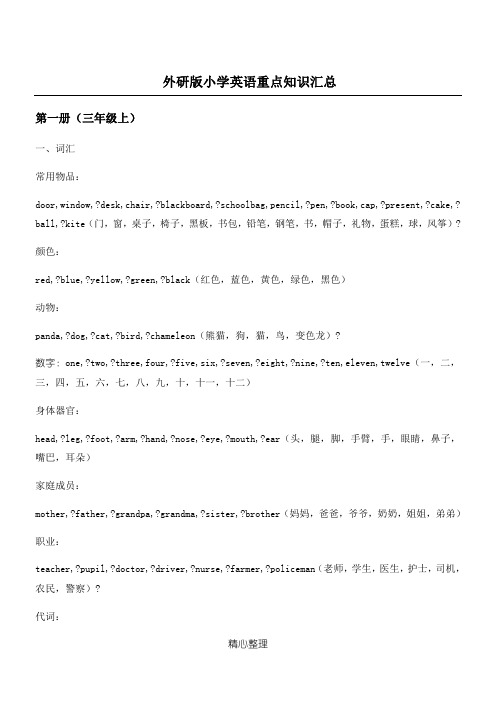
外研版小学英语重点知识汇总第一册(三年级上)一、词汇常用物品:风筝)? 颜色:动物:数字:mother,?father,?grandpa,?grandma,?sister,?brother(妈妈,爸爸,爷爷,奶奶,姐姐,弟弟)职业:teacher,?pupil,?doctor,?driver,?nurse,?farmer,?policeman(老师,学生,医生,护士,司机,农民,警察)?代词:I,?you,?it,?me,?he,?she,?your,?my,?his,?her,?this,?that(我,你,它,我,他,她,你的,我的,他的,她的,这个,那个)?二、句型?1、打招呼及问好:Hello!(你好)??Hi!(你好)Byebye.Thanks!----I’m?fine,?thank?you.(我很好,谢谢你。
)祝别人生日快乐说:Happy?birthday!?(生日快乐!)给别人东西时说:Here’s?your?present.?(给你的礼物。
)2、询问姓名:----What’s?your?name??----I’m?+姓名。
例句:----I’3It’It’例句:It’It’4How?many?+(名词复数)?例句:----How?many?boys??(多少个男孩?)----Twelve?boys.(12个男孩。
)----How?many?red?caps??(多少顶红色的帽子?)----One?red?cap.?(一顶红色的帽子)5、询问年龄:----How?old?are?you??----I’m?+年龄例句:----I’6----It例句:----It----It7This?is?my?+?物/人。
例句:This?is?my?school.(这是我的学校。
)That?is?my?classroom.(那是我的教室。
)This?is?my?English?teacher.?(这是我的英语老师。
小学英语复习资料

小学英语总复习资料一:学生易错词汇1. a, an的选择: 元音字母开头的单词用an,辅音字母开头的单词用a.2. am , is , are的选择: 单数用is , 复数用are. I 用am , you 用are.3. have , has 的选择: 表示某人有某物.单数用has , 复数用have. I ,you 用have .4. there is, there are 的选择:表示某地有某物,某人.单数用there is , 复数用there are.5. some, any 的选择:肯定句用some, 疑问句和否定句用any.6. 疑问词的选择:what (什么) who (谁) where (哪里) whose (谁的) why(为什么)when(什么时候)which(哪一个)how old (多大) how many (多少)how much(多少钱)二:形容词比较级详解当我们需要对事物作出比较时,需要用到比较级.比较级的句子结构通常是:什么+ 动词be (am , is , are ) + 形容词比较级+ than(比)+ 什么,如:I'm taller and heavier than you. (我比你更高和更重.)An elephant is bigger than a tiger. (一只大象比一只老虎更大.)形容词的比较级是在形容词的基础上变化而来的,它的变化规则是:①一般的直接在词尾加er ,如tall - taller , strong - stronger ,②以e结尾的,直接加r ,如fine –finer ,③以辅音字母加y结尾的,先改y为i再加er,如funny - funnier④双写最后的字母再加er,如big –bigger, thin –thinner ,hot –hotter☆注意☆比较的两者应该是互相对应的可比较的东西.典型错误:My hair is longer than you.(我的头发比你更长.)比较的两者是我的头发,你(整个人),那么比较的对象就没有可比性.应该改为:My hair is longer than yours. 或My hair is longer than your hair.比较级专项练习: 一,从方框中选出合适的单词完成句子heavy tall long big(1) How is the Yellow River(2) How is Mr Green He's 175cm.(3) How are your feet I wear size 18.(4)How is the fish It's 2kg.三:动词过去式详解动词的过去式的构成规则有:A,规则动词①一般直接在动词的后面加ed:如worked , learned , cleaned , visited②以e结尾的动词直接加d:如lived , danced , used③以辅音字母加y结尾的动词要改y为i再加ed(此类动词较少)如study –studied carry –carried worry –worried (注意play,stay不是辅音字母加y,所以不属于此类)④双写最后一个字母(此类动词较少)如stoppedB,不规则动词(此类词并无规则,须熟记)小学阶段要记住以下动词的原形和过去式:sing –sang , eat –ate , see –saw , have –had , do –did , go - went , take - took , buy - bought , get - got , read - read ,fly - flew , am/is - was ,are - were , say - said , leave - left , swim - swam , tell - told , draw - drew , come - came , lose - lost , find - found , drink - drank , hurt - hurt , feel - felt四:动词现在分词详解动词的ing形式的构成规则:①一般的直接在后面加上ing , 如doing , going , working , singing , eating②以e 结尾的动词,要先去e再加ing ,如having , writing③双写最后一个字母的(此类动词极少)有:running , swimming , sitting , getting五:人称代词与物主代词一、人称代词人称单数复数主格宾格主格宾格第一人称Imeweus第二人称youyouyouyou第三人称hehimtheythemsheheritit二、物主代词数人称类别单数复数第一人称第二人称第三人称第一人称第二人称第三人称形容词性物主代词myyourhisheritsouryourtheir名词性物主代词mineyourshersitsoursyourstheirs汉语我的你的他的她的它的我们的你们的他(她、它)们的六:句型专项归类1.肯定句:是指用肯定的语气来陈述的句子,如:I'm a student. She is a doctor. He works in a hospital.There are four fans in our classroom. He will eat lunch at 12:00. I watched TV yesterday evening. 2,否定句:含有否定词或表示否定意义词的句子,如:I'm not a student. She is not (isn't) a doctor. He does not (doesn't) work in a hospital. There are not (aren't) four fans in our classroom.He will not (won't) eat lunch at 12:00. I did not (didn't) watch TV yesterday evening.☆注意☆小结:否定句主要是在肯定句的基础上加上了否定词"not".有动词be的句子则"not"加在be后面,可缩写成"isn't,aren't",但am not 一般都分开写.没有动词be的句子则要先在主要动词的前面加上一个助动词(do,does,did),然后在它后面加上"not",你也可以把它们缩写在一起如"don't , doesn't , didn't ).这三个助动词要根据人称和时态来选择,其中"does"只用于一般现在时主语是第三人称单数的情况,而"did"只用于一般过去时,不论主语是什么人称和数,都用"did" .3,一般疑问句:是指询问事实的句子,此类句子必须用"yes",或"no"来回答.如:Are you a student Yes, I am / No, I'm not.Is she a doctor Yes, she is. / No, she isn't.Does he work in a hospital Yes, he does. / No, he doesn't.Are there four fans in our classroom Yes, there are. / No, there aren't.Are you going to buy a comic book tonight Yes, I am. / No, I am not. (Yes, we are. / No, we aren't.)Will he eat lunch at 12:00 Yes, I will. / No, I will not(won't).Are they swimming Yes, they are. / No, they aren't.Did you watch TV yesterday evening Yes, I did. / No, I didn't.☆注意☆小结:一般疑问句是在肯定句的基础上,①把动词be调到首位,其他照写,末尾标点符号变成问号即可.②没有动词be的句子则要在句首加上一个助动词(do,does,did)再把紧跟在后面的动词变回原形,末尾标点符号变成问号即可.这三个助动词也要根据人称和时态来选择,其中"does"只用于一般现在时主语是第三人称单数的情况,而"did"只用于一般过去时,不论主语是什么人称和数,都用"did" .一般疑问句有个重要的原则就是问和答要一致,即问句里的第一个单词(助动词)和简略答句里的这个词是一致的.4,特殊疑问句:以特殊疑问词(what , where , who , which , when , whose , why , how等)开头引导的句子.此类句子应该问什么就答什么,不能用"yes ,no"来回答.如:What is this It's a computer.What does he do He's a doctor.Where are you going I'm going to Beijing.Who played football with you yesterday afternoon Mike.Which season do you like best Summer.When do you usually get up I usually get up at 6:30.Whose skirt is this It's Amy's.Why do you like spring best Because I can plant trees.How are you I'm fine. / I'm happy.How did you go to Xinjiang I went to Xinjiang by train.☆其中how又可以和其他一些形容词连用组成特殊疑问词组用来提问,如: how many(多少(数量)), how much(多少(钱)), how tall(多高), how long(多长), how big(多大), how heavy(多重) 例句:How many pencils do you have I have three pencils.How many girls can you see I can see four girls.How many desks are there in your classroom There are 51.☆小结:how many 用来提问可数名词的数量,主要有以上三种句式搭配,How many + 名词复数+ do you have 你有多少……How many + 名词复数+ can you see 你能看见多少……How many + 名词复数+ are there…有多少……七:完全,缩略形式: I'm=I am he's=he is she's=she is they're=they are you're=you are there's=there is they're=they are can't=can not don't=do not doesn't=does not isn't=is not aren't=are not let's=let us won't=will not I'll=I will wasn't=was not总结:通常情况下,'m即am,'s即is(但let's=let us), 're即are ,n't即not (但can't=can not)八:小学英语词汇不完全归类表学习用品(school things):pen钢笔pencil铅笔pencil-case铅笔盒ruler尺子book书bag包comic book漫画书post card明信片newspaper报纸schoolbag书包eraser橡皮crayon蜡笔sharpener卷笔刀story-book故事书notebook笔记本Chinese book语文书English book英语书math book数学书magazine杂志dictionary词典人体(body):foot脚head头face脸hair头发nose鼻子mouth嘴eye眼睛ear耳朵arm手臂hand手finger手指leg腿tail尾巴颜色(colours):red红blue蓝yellow黄green绿white白black黑pink粉红purple紫orange 橙brown棕动物(animals):cat猫dog狗pig猪duck鸭rabbit兔horse马elephant大象ant蚂蚁fish鱼bird鸟eagle鹰beaver海狸snake蛇mouse老鼠squirrel松鼠kangaroo袋鼠monkey猴panda熊猫bear熊lion狮子tiger老虎fox狐狸zebra斑马deer鹿giraffe长颈鹿goose 鹅hen母鸡turkey火鸡lamb小羊sheep绵羊goat山羊cow奶牛donkey驴squid鱿鱼lobster龙虾shark鲨鱼seal海豹sperm whale抹香鲸killer whale虎鲸人物(people):friend朋友boy男孩girl女孩mother母亲father父亲sister姐妹brother兄弟uncle叔叔;舅舅man男人woman女人Mr.先生Miss小姐lady女士;小姐mom妈妈dad 爸爸parents父母grandparents祖父母grandma/grandmother(外)祖母grandpa/grandfather(外)祖父aunt姑姑cousin堂(表)兄弟;堂(表)姐妹son儿子daughter女儿baby婴儿kid小孩classmate同学queen女王visitor参观者neighbour邻居principal校长university student大学生pen pal笔友tourist旅行者people人物robot机器人职业(jobs):teacher教师student学生doctor医生nurse护士driver司机farmer农民singer 歌唱家writer作家actor男演员actress女演员artist画家TV reporter电视台记者engineer 工程师accountant会计policeman(男)警察salesperson销售员cleaner清洁工baseball player棒球运动员assistant售货员police警察食品,饮料(food & drink):rice米饭bread面包beef牛肉milk牛奶water水egg蛋fish鱼tofu豆腐cake蛋糕hot dog热狗hamburger汉堡包French fries炸薯条cookie曲奇biscuit 饼干jam果酱noodles面条meat肉chicken鸡肉pork猪肉mutton羊肉vegetable蔬菜salad沙拉soup汤ice冰ice-cream冰淇淋Coke可乐juice果汁tea茶coffee咖啡breakfast 早餐lunch午餐dinner/supper晚餐meal一餐水果,蔬菜(fruit & vegetables):apple苹果banana香蕉pear梨orange橙watermelon西瓜grape葡萄eggplant茄子green beans青豆tomato西红柿potato土豆peach桃strawberry 草莓cucumber黄瓜onion洋葱carrot胡萝卜cabbage卷心菜衣服(clothes):jacket夹克衫shirt衬衫T-shirt丅恤衫skirt短裙子dress连衣裙jeans牛仔裤pants长裤socks袜子shoes鞋子sweater毛衣coat上衣raincoat雨衣shorts短裤sneakers 网球鞋slippers拖鞋sandals凉鞋boots靴子hat(有沿的)帽子cap便帽sunglasses太阳镜tie领带scarf围巾gloves手套trousers裤子cloth布交通工具(vehicles):bike自行车bus公共汽车train火车boat小船ship轮船yacht快艇car 小汽车taxi出租车jeep吉普车van小货车;面包车plane/airplane飞机subway/underground 地铁motor cycle摩托车杂物(other things): window窗户door门desk课桌chair椅子bed床computer计算机board 写字板fan风扇light灯teacher's desk讲台picture图画;照片wall墙壁floor地板curtain 窗帘trash bin垃圾箱closet壁橱mirror镜子end table床头柜football/soccer足球present 礼物walkman随身听lamp台灯phone电话sofa沙发shelf书架fridge冰箱table桌子TV 电视air-conditioner空调key钥匙lock锁photo照片chart图表plate盘子knife刀fork 叉spoon勺子chopsticks筷子pot锅gift礼物toy玩具doll洋娃娃ball球balloon气球kite风筝jigsaw puzzle拼图游戏box盒子umbrella伞zipper拉链violin小提琴yo-yo溜溜球nest鸟窝hole洞tube管子toothbrush牙刷menu菜单e-card电子卡片e-mail电子邮件traffic light交通灯money钱medicine药地点(locations):home家room房间bedroom卧室bathroom卫生间living room起居室kitchen厨房classroom教室school学校park公园library图书馆post office邮局police office警察局hospital医院cinema电影院bookstore书店farm农场zoo动物园garden花园study书房playground操场canteen食堂teacher's office教师办公室library图书馆gym 体育馆washroom卫生间art room绘画教室computer room计算机教室music room音乐教室TV room电视机房flat公寓company公司factory工厂fruit stand水果摊pet shop宠物商店nature park自然公园theme park主题公园science museum科学博物馆the Great Wall 长城supermarket超市bank银行country国家village乡村city城市hometown家乡bus stop公交车站课程(classes): sports体育运动science科学Moral Education思想品德课Social Studies社会课Chinese语文math数学PE体育课English英语课国家,城市(countries & cities): China/PRC中国America/USA美国UK联合王国England英国Canada/CAN加拿大Australia澳大利亚New York纽约London伦敦Sydney悉尼Moscow 莫斯科Cairo开罗气象(weather): cold寒冷的warm温暖的cool凉爽的snowy下雪的sunny晴朗的hot炎热的rainy下雨的windy有风的cloudy多云的weather report天气预报景物(nature): river河流lake湖泊stream河;溪forest森林path小道road公路house房子bridge桥building建筑物rain雨cloud云sun太阳mountain山sky天空rainbow彩虹wind 风air空气moon月亮植物(plants): flower花grass草tree树seed种子sprout苗plant植物rose玫瑰leaf叶子星期(week): Monday星期一Tuesday星期二Wednesday星期三Thursday星期四Friday星期五Saturday星期六Sunday星期天weekend周末月份(months): Jan. (January)一月Feb.(February)二月Mar.(March)三月April四月May五月June六月July七月Aug.(August)八月Sept.(September)九月Oct.(October)十月Nov.(November)十一月Dec.(December)十二月季节(seasons): spring春summer夏fall/autumn秋winter冬方位(directions): south南north北east东west西left 左边right右边患病(illness): have a fever发烧hurt疼痛have a cold感冒have a toothache牙疼have a headache头疼have a sore throat喉咙疼数词(numbers): one一two二three三four四five五six六seven七eight八nine九ten 十eleven十一twelve十二thirteen十三fourteen十四fifteen十五sixteen十六seventeen 十七eighteen十八nineteen十九twenty二十thirty三十forty四十fifty五十sixty六十seventy七十eighty八十ninety九十forty-two四十二hundred百one/a hundred and thirty-six 一百三十六first第一second第二third第三fourth第四fifth第五eighth第八ninth第九twelfth第十二twentieth第二十thirtieth第三十fortieth第四十fiftieth第五十sixtieth第六十seventieth第七十eightieth第八十ninetieth第九十fifty-sixth第五十六形容词(adj.): big大的small小的long长的tall高的short短的;矮的young年轻的old旧的;老的strong健壮的thin瘦的active积极活跃的quiet安静的nice好看的kind和蔼亲切的strict严格的smart聪明的funny滑稽可笑的tasty好吃的sweet甜的salty咸的sour酸的fresh新鲜的favourite最喜爱的clean干净的tired疲劳的excited兴奋的angry生气的happy高兴的bored无聊的sad忧愁的taller更高的shorter更矮的stronger更强壮的older 年龄更大的younger更年轻的bigger更大的heavier更重的longer更长的thinner更瘦的smaller更小的good好的fine好的great很好的heavy 重的new新的fat胖的happy快乐的right对的hungry饥饿的cute逗人喜爱的little小的lovely可爱的beautiful漂亮的colourful色彩鲜艳的pretty漂亮的cheap便宜的expensive昂贵的juicy多汁的tender嫩的healthy健康的ill有病的helpful有帮助的high高的easy简单的proud骄傲的sick有病的better更好的higher更高的介词(prep.): in在……里on在……上;在……时候under在……下面near在……的旁边behind在……后边next to与……相邻over在……上面in front of在……前面代词(pron.): I我we我们you你;你们he他she她it它they他(她,它)们my我的our 我们的your你的;你们的his他的her她的动词(v.):play(.ed)玩;踢swim(swam)游泳skate滑冰fly(flew)飞jump跳walk走run(ran)跑climb爬fight(fought)打架swing(swung)荡eat(ate)吃sleep(slept)睡觉like像,喜欢have(had)有;吃turn转弯buy(bought)买take(took)买;带live居住teach(taught)教go(went)去study(studied)学习learn学习sing(sang)唱歌dance跳舞row划do(did)做do homework做作业do housework做家务watch TV看电视read(read) books读书cook the meals做饭water the flowers浇花sweep(swept) the floor扫地clean the bedroom打扫卧室make(made) the bed铺床set(set) the table摆饭桌wash the clothes洗衣服do the dishes洗碗碟use a computer使用计算机do morning exercises晨练;做广播操eat breakfast吃早饭eat dinner吃晚饭go to school上学have English class上英语课play sports进行体育运动get(got)up起床climb mountains爬山go shopping买东西play the piano弹钢琴visit grandparents看望(外)祖父母go hiking去远足fly kites放风筝make a snowman堆雪人plant trees种树draw(drew) pictures画画cook dinner做饭read a book看书answer the phone接电话listen to music听音乐clean the room打扫房间write(wrote) a letter写信write an e-mail写电子邮件drink(drank) water喝水take pictures照相watch insects观察昆虫pick up leaves采摘树叶do anexperiment做实验catch butterflies捉蝴蝶count insects数昆虫collect insects收集昆虫collect leaves收集树叶write a report写报告play chess下棋have a picnic举行野餐get to到达ride(rode) a bike骑自行车play the violin拉小提琴make kites制作风筝collect stamps集邮meet(met)见面welcome欢迎thank谢谢love爱work工作drink(drank)喝taste尝smell 闻feed(fed)喂养shear剪milk挤奶look看guess猜help帮助pass传递show展示use 使用clean打扫open打开close关上put放paint绘画tell(told)告诉kick踢bounce反弹ride(rode)骑stop(stopped)停wait等find(found)寻找到drive(drove)驾驶fold折send(sent)寄wash洗shine照耀become变成feel(felt)感觉到think(thought)思考meet(met)遇见fall(fell)落下leave(left)离开wake(woke) up醒来put on穿上take off脱掉hang up挂起wear(wore)穿go home回家go to bed上床睡觉play computer games玩电脑游戏play chess 下棋empty the trash倒垃圾put away the clothes收拾衣服get off下车take a trip去旅行read a magazine读杂志go to the cinema去看电影go straight向前直走.。
小学英语总复习资料完整版

小学英语总复习资料完整版文稿归稿存档编号:[KKUY-KKIO69-OTM243-OLUI129-G00I-FDQS58-小学期间重要词汇:学习用品(school things):pen钢笔pencil铅笔pencil-box铅笔盒ruler尺子book书bag包 schoolbag书包eraser 橡皮 crayon 蜡笔comicbook漫画书postcard明信片newspaper报纸storybook故事书notebook笔记本Chinesebook语文书Englishbook英语书mathbook数学书magazine杂志dictionary词典人体(body):foot脚head头face脸hair头发nose鼻子mouth嘴eye眼睛ear耳朵arm 手臂hand手finger手指leg腿tail尾巴颜色(colours):red红blue蓝yellow黄green绿white白black黑pink粉红purple紫orange橙brown棕动物(animals):cat猫dog狗pig猪duck鸭rabbit兔horse马elephant大象ant蚂蚁fish鱼bird鸟snake蛇mouse老鼠(mice 复数)monkey猴panda熊猫bear熊lion狮子tiger老虎fox狐狸zebra斑马deer鹿giraffe长颈鹿goose鹅hen母鸡turkey火鸡lamb小羊sheep绵羊goat山羊cow奶牛人物(people):friend朋友boy男孩girl女孩mother(mum)母亲father(dad)父亲sister 姐妹brother兄弟uncle叔叔;舅舅aunt姑姑 man男人woman女人Mr.先生Miss小姐lady女士;小姐parents父母grandparents祖父母grandma/grandmother(外)祖母grandpa/grandfather(外)祖父cousin堂(表)兄弟;堂(表)姐妹son儿子daughter女儿baby婴儿kid小孩classmate同学penpal笔友tourist旅行者people人物robot机器人职业(jobs):teacher教师student学生doctor医生nurse护士cook 厨师 driver司机farmer农民singer歌唱家writer作家actor男演员actress女演员artist画家TVreporter电视台记者engineer工程师cleaner清洁工basketballplayer篮球运动员factory worker 工厂工人 postman 邮递员 businessman 商人 post officer 警察fisherman 渔民 scientist 科学家 pilot 飞行员 coach 教练食品,饮料(food&drink):rice米饭bread面包beef牛肉milk牛奶water水egg蛋fish 鱼tofu豆腐cake蛋糕hotdog热狗hamburger汉堡包Frenchfries炸薯条cookie曲奇biscuit饼干jam果酱noodles面条meat肉chicken鸡肉pork猪肉mutton羊肉vegetable蔬菜salad沙拉sandwich 三明治soup汤ice冰ice cream冰淇淋Coke可乐juice果汁tea茶coffee咖啡breakfast早餐lunch午餐dinner/supper晚餐meal一餐水果,蔬菜(fruit&vegetables):apple苹果banana香蕉pear梨orange橙watermelon西瓜grape葡萄eggplant茄子greenbeans青豆tomato西红柿potato土豆peach桃strawberry草莓onion洋葱carrot胡萝卜cabbage卷心菜衣服(clothes):jacket夹克衫shirt衬衫T-shirt丅恤衫skirt短裙子dress连衣裙jeans牛仔裤pants长裤socks袜子shoes鞋子sweater毛衣coat上衣shorts短裤hat(有沿(de))帽子cap便帽sunglasses太阳镜tie领带scarf围巾gloves手套umbrella 雨伞 cloth布交通工具(vehicles):bike自行车bus公共汽车train火车boat小船ship轮船car小汽车taxi出租车plane飞机subway地铁on foot 步行杂物(otherthings):window窗户door门desk课桌chair椅子bed床computer计算机blackboard黑板fan风扇light灯teacher'sdesk讲台picture图画;照片wall墙壁floor地板football/soccer足球phonesofa沙发fridge冰箱table桌子TV电视key钥匙photo照片plate 盘子bowl碗knife刀fork叉spoon勺子chopsticks筷子gift礼物toy玩具key 钥匙 map地图ball球balloon气球kite风筝box盒子umbrella伞violin 小提琴menu菜单e-mail电子邮件trafficlight交通灯money钱medicine药地点(locations):home家room房间bedroom卧室bathroom卫生间livingroom起居室kitchen厨房classroom教室school学校park公园library图书馆postoffice邮局policeoffice警察局hospital医院cinema电影院bookstore书店farm农场zoo动物园办公室library图书馆gym体育馆bathroom卫生间artroom绘画教室computerroom计算机教室musicroom音乐教室TVroom电视机房company公司factory工厂petshop宠物商店naturepark自然公园themepark主题公园sciencemuseum科学博物馆theGreatWall长城supermarket超市 restaurant餐馆bank银行country国家village乡村city城市hometown家乡busstop公交车站课程(classes):Chinese class语文math class数学PE class体育课English class英语课music class 音乐课 art class 美术课国家,城市(countries&cities):China中国America/USA美国UK联合王国England英国Canada加拿大Australia澳大利亚NewYork纽约London伦敦Sydney悉尼Moscow莫斯科气象天气(weather):cold寒冷(de)warm温暖(de)cool凉爽(de) hot 热(de)snowy下雪(de)sunny晴朗(de)rainy下雨(de)windy有风(de)cloudy多云(de)weatherreport天气预报景物(nature):river河流lake湖泊forest森林road公路house房子bridge桥building建筑物rain雨cloud云sun太阳mountain山 hill 小山sky天空rainbow彩虹wind风air空气moon月亮植物(plants):flower花grass草tree树plant植物rose玫瑰leaf叶子星期(week):Monday星期一Tuesday星期二Wednesday星期三Thursday星期四Friday星期五Saturday星期六Sunday星期天weekend周末月份(months):Jan.(January)一月Feb.(February)二月Mar.(March)三月April四月May 五月June六月July七月Aug.(August)八月Sept.(September)九月Oct.(October)十月Nov.(November)十一月Dec.(December)十二月季节(seasons):spring春summer夏fall/autumn秋winter冬方位(directions):south南north北east东west西turn left(at)左边 turn right(at)右边go straight 直走患病(illness):haveafever发烧hurt疼痛haveacold感冒数词(numbers):one一two二three三four四five五six六seven七eight八nine九ten十eleven十一twelve十二thirteen十三fourteen十四fifteen十五sixteen十六seventeen十七eighteen十八nineteen十九twenty二十thirty三十forty四十fifty五十sixty六十seventy七十eighty八十ninety九十forty-two四十二hundred百one/ahundredandthirty-six一百三十六first第一second第二third第三fourth第四fifth第五eighth第八ninth第九twelfth第十二twentieth第二十thirtieth第三十形容词(adj.):big大(de)small小(de)long长(de)tall高(de)short短(de);矮(de)young年轻(de)old旧(de);老(de)strong健壮(de)friendly 有好(de)thin瘦(de)fat胖(de) active积极活跃(de)quiet安静(de)nice好看(de)kind和蔼亲切(de) polite 有礼貌(de) hard-working 工作努力(de) shy 害羞(de)strict严格(de)clever聪明(de)funny滑稽可笑(de)tasty好吃(de)sweet甜(de)salty咸(de)sour酸(de)fresh 新鲜(de) hot 辣(de) delicious 美味(de)favourite最喜爱(de)clean干净(de)tired疲劳(de)angry生气(de) happy高兴(de)sad忧愁(de)good好(de)fine好(de)great很好(de)heavy重(de)new新(de)happy快乐(de)right对(de)hungry饥饿(de)thirsty 渴(de)cute逗人喜爱(de)little小(de)lovely可爱(de)beautiful漂亮(de)colourful色彩鲜艳(de)pretty漂亮(de)cheap便宜(de)expensive昂贵(de)juicy多汁(de)tender嫩(de)healthy健康(de)ill有病(de)helpful有帮助(de)high高(de)easy简单(de)proud骄傲(de)taller更高(de)shorter更矮(de)stronger更强壮(de)older年龄更大(de)younger更年轻(de)bigger更大(de)heavier更重(de)longer更长(de)thinner更瘦(de)smaller更小(de)better更好(de)(good 和well (de)比较急higher更高(de)介词(prep.):in在……里on在……上;在……时候under在……下面near在……(de)旁边behind在……后边nextto与……相邻over在……上面infrontof在……前面above 在……上面 between 在……中间 beside 在旁边动词(v.):get(gets, got) up 起床 go(goes, went) to school去上学 go home 回家go to bed 上床睡觉 wash( washes, washed)my clothes 洗我(de)衣服 watch( watches, watched)TV 看电视 do(does, did) homework 做作业 read(reads, read) books 看书play( plays, played)踢足球 play basketball 打篮球 play ping-pong 打乒乓球play badmiton 打羽毛球 play the pipa 弹琵琶 do kungfu 练功夫 draw(draws, drew) cartoons 画漫画 cook(cooks, cooked)烹饪 swim( swims, swam) go swimming 游泳speak(speaks, spoke) English 说英语 eat(eats, ate) breakfast 吃早饭 have(has, had)…class 上……课 play sports 进行体育运动 do morning exercises 做早操 eat dinner 吃晚饭 clean(cleans, cleaned) my room 打扫我(de)房间 go for a walk 散步go shopping 去购物 take(takes, took) a dancing class 上舞蹈课 go on a picnic去野餐 pick(picks, picked) apples 摘苹果 make(makes, made) a snowman 堆雪人turn(turns, turned) left 向左转 turn right 向右转 slow down 慢下来 stop(stops, stopped)停下 visit(visits, visited) my grandparents 拜访我(de)外祖父母see(sees, saw) a film 看电影 take a trip 去旅行 go to the supermarket 去超市cook Chineses food 做中国菜 study(studies, studied) Chinese 学习中文 do word puzzles 猜字谜 go hiking 去远足see a doctor 看医生 do more exercise 做更多(de)锻炼 wear(wears, wore) warm clothes 穿厚点 take a deep breath 深呼吸 count toslept) 睡觉 go camping 野营 go fishing 去钓鱼 ride(rides, rode) a horse 骑马hurt(hurts, hurt) my foot 伤了脚 take pictures 照相 buy(buys, bought) gifts 买礼物 go cycling 骑自行车 ice-skate = go ice-skating =go skating 滑冰小学期间重要句型特殊疑问句Where are you from 你是哪里人I’m from the UK. 我是英国人.Where is my pencil box 我(de)铅笔盒在哪It’s in your desk. 在你(de)桌子里. Where is it 它在哪It’s near the window. 就在窗户旁边.Where are the keys 钥匙在哪Where is the teachers’ office 教师(de)办公室在哪里It’s on the second floor. 它在二楼.Where is the museum shop 博物馆商店在哪里It’s near the door. 在大门附近. Where are you going 你们打算去哪We’re going to the cinema. 我们打算去电影院. Where does he work 他在哪工作 He works at sea. 他在海上工作.Where did you go 你去了哪里Who’s that man 那位男士是谁He’s my father. 他是我(de)爸爸.Who’s he 他是谁Whose coat is this 这是谁(de)外套It’s mine. 它是我(de).Whose pants are those 那条裤子是谁(de) They are your father’s. 它们是你爸爸(de).Whose is it 这是谁(de) It’s Zhang Peng’s. 是张鹏(de).What’s your/his name 你叫什么名字My/His name’s John. 我叫约翰.What’s this/that 这/那是什么It’s a duck. 它是只鸭子.What are these/those 这些/那些是什么They’re tomatoes.What’s in your schoolbag 你(de)书包里有什么What colour is it 什么颜色(de) It’s blue and white. 是蓝白色(de).What’s for dinner 晚餐吃什么What would you like 你想吃什么I’d li ke (I would like)some soup and bread. 我想要汤和面包. What would you like to eat 你想吃什么 A sandwich, please. 请给我一个三明治. What would you like to drink 你想喝什么I’d like some water. 我想喝点水.What’s your favourite food 你最喜欢吃什么食物Noodles. They’re delicious. 面条.面条很好吃.W hat’s your aunt’s job 你婶婶做什么工作She’s a nurse. 她是为护士.What tiime is it 几点了It’s 6 o’clock. 六点了.What’s the weather like in New York纽约天气怎么样It’s rainy. 是下雨天.What are they doing 他们在干什么They’re eating lunch. 他们在吃午饭. What’s the little monkey doing 那只小猴子在干什么It’s playing with its mother. 它在和妈妈玩耍. What’s he like 他什么样He’s kind. 他很和蔼. What do you have on Thursdays 星期四你有什么课 I have math, English, and music.What can you do for the party, children 孩子们,你们能为联欢会做什么呢I can sing English songs. 我会唱英语歌.What are you going to do tomorrow 你明天打算做什么I’m going to have an art lesson. 我要上美术课.What are Peter’s hobbies 彼得有什么爱好 He likes reading stories. 他喜欢读故事.What does he do 他是做什么(de) He’s a businessman. 他是商人.What’s wrong(with+某人) (某人)怎么了 Your father is ill. 你爸爸病了. What did you do last weekend 你上周末干了什么 What happened 怎么了How are you 你好吗I’m fine, thank you. 我很好,谢谢你.How old are you 你几岁了I’m six years old. 我六岁了.How many plates (你要)几个盘子How many kites do you see 你看见了多少只风筝How many crayons do you have 你有多少只蜡笔How many people are there in your family, Chen Jie 你家有几口人,陈洁My family has six people. 我家有6口人.How do you like this skirt 这条短裙你觉得怎么样It’s very pretty. 它很漂亮. How much is this skirt 这条短裙多少钱It’s $89. 它89美元.How do you come to school 你怎么来学校(de) Usually, I come on foot. 通常我走路来.How does he go to work 他怎么上班 He goes to work by bike. 他骑自行车上班. How tall are you 你多高I’m 1.65 meters. 我身高1.65米.How heavy are you 你多重I’m 48kilograms. 我体重48公斤.How was your weekend 你周末过得怎么样 It was good, thank you. 很好,谢谢.How did you go there 你们怎么去(de) We went there by plane. 我们坐飞机去(de). How do you know that 你怎么知道(de)When is the party 聚会在什么时候It’s in April. 在4月.When is the trip this year 今年(de)秋游在什么时候It’s in October. We’ll go to the Great Wall. 在10月. 我们将去长城.When is April Fool’s Day 愚人节是哪天It’s on April 1st. 它在4月1日.When is your birthday 你(de)生日是哪天 My birthday is on April 4th .When are you going 你们什么时候去When do you finish class in the morning 你们上午(de)课几点结束We finish class at 1 o’clock. 我们1点钟结束上午(de)课.Which season do you like best = What’s your favourite season 你最喜欢(de)季节是什么Winter.= I like winter. =I like winter best. = winter is my favourite season. Why 为什么 Because I like summer vacation. 因为我喜欢暑假.一般疑问句Is she your mother 她是你(de)妈妈吗 Yes, she is. 是(de),她是. No, she isn’t. 不,她不是.Is it in your bag 在你(de)包里吗No, it isn’t. 不,没有在我包里.Is she in the living room 她在客厅里吗No, she isn’t. 不,她不在.Is this the teachers’ office 这是教师办公室吗No, it isn’t. The teachers’ office is next to the library. 不,不是.教师办公室挨着图书馆.Is that the computer room 那是计算机房吗Is it cold 天冷吗No, it isn’t. 不,不冷.Is he young 他年轻吗No, he isn’t. 不,他不年轻.Is he drinking water 它在喝水吗No, he isn’t. He’s eating. 不是.它在吃东西. Is there a river in the forest, Miss White 怀特小姐,森林里有河吗No, there isn’t.不,森林里没有河.Are there any tall buildings in the nature park 自然公园里有高楼吗No, there aren’t. 不,自然公园里没有高楼.Are they on the table 它们在桌子上吗No, they aren’t. They’re in the door. 不,不在.它们在门上.Are these carrots 这些是胡萝卜吗 Yes, they are. 是(de).Are they hens 它们是母鸡吗No, they aren’t. They’re ducks. 不,不是.它们是鸭子.Are these yours 这(双鞋)是你(de)吗No, they aren’t. 不,不是.Are these all ours 这些都是我们(de)吗Can I have some water, please 请给我些水好吗Can I go outside now 现在我能出去吗Yes, you can. / No, you can’t. 可以/不可以.Can I try them on 我能试试吗Can you do any kung fu, Jhon 约翰,你会武术吗 Yes, I can. 是(de),我会武术. Could you see stars at night 在晚上你可以看到星星吗 Yes, I could. 可以.Would you like a knife and fork 你想要刀和叉吗 Yes, please.Do you like oranges 你喜欢橙子吗Yes, I do./ No, I don’t. 是(de),我喜欢./不,我不喜欢.Do you have a library 你们有一个图书馆吗 Yes, we do. 是(de),有.Do you often read books in the park 你经常在这个公园里看书吗No, I don’t. 不, 我不经常在这里看书.Does he live in Sydney 他住在悉尼吗No, he doesn’t. 不,他没有.Does he like doing word puzzles and go hiking 他喜欢猜字谜和远足吗Yes, he does. 是(de),他喜欢.Did you do anything else 你还做了其他什么事吗Yes, I cleaned my room and washed my clothes. 是(de),我到扫了房间,还洗了衣服. Did you see a film 你看电影了吗No, I had a cold. I stayed at home all weekend and slept. 没有,我感冒了.整个周末都待在家睡觉.Did you go to Turpan 你们去吐鲁番了吗Yes, we did./ No, we didn’t. 是(de),我们去了./ 不,我们没去.陈述句It’s so tall 它好高啊 Come here, children 到这里来,孩子们I have a ruler/ an eraser. 我有一把尺子/ 一块橡皮.It has a long nose. 它有长鼻子. It has small eyes and big ears. 它有小眼睛和大耳朵.We have a new classroom. 我们有间新教室.He has glasses and his shoes are blue. 他戴眼镜,穿蓝色(de)鞋子.My family has six people. 我家有6口人.I can use chopsticks. 我会用筷子.It’s time for breakfast/English class. 是时候吃早饭了/上英语课了.It’s time to go home/get up. 是时候回家/起床了.It’s cold outside. 外面冷. It’s rainy. 是下雨天. It’s 26 degrees. 是26度.There is a big bed. (这里)有一张大床.There are so meny pictures here. 这里有这么多幅画.There was no library in my old school. 我以前(de)学校没有图书馆.There were no computers or Internet in my time. 我那时候没有电脑也没有网络. The yellow picture is mine. 那副黄颜色(de)画是我(de).In the USA people on bikes must wear one. 在美国骑自行车(de)人必须戴(头盔 a helmet).I must pay attention to the traffic nights. 我必须注意交通信号灯.We are going to draw some pictures in Renmin Park. 我们要到人民公园去画画. They are afraid of him. 它们害怕它.The cat is angry with them. 这只猫很生它们(de)气.He should see a doctor this morning. 他今天早上应该去看医生.That’s the tallest dinosaur in this hall. 那是这个厅里最高(de)恐龙.It’s taller that both of us together. 它比我俩加起来还高.I want to buy the new film magazine. 我想买期新(de)电影杂志.Before, I was quiet. Now, I’m ver y active in class. 以前,我很安静.现在我在课堂上很活跃.I was short, so I couldn’t ride my bike well. Now, I go cycling every day.我以前个子小,自行车骑不好.现在我天天骑车.I don’t like grapes. 我不欢葡萄.Me, neither. 我也不喜欢.(祈使句)Look at me 看我Have a good time 玩开心点儿Have some bread. 吃点面包吧.Talk quietly. 小声讲话.Keep your desk clean. 保持桌面整洁.Open it and see 打开看看Tell us about your school, please. 请给我们讲讲您(de)学校吧.Let’s go home 我们回家吧Honey, let’s buy some fruit. 宝贝儿, 我们买点水果吧.Let’s go to school 我们一起回家吧Let’s make a puppet (让)我们一起做个木偶吧Let’s go and se e 我们去看看吧Let’s clean the classroom 我们打扫教室吧Let me clean the windows. 我来擦窗户.Don’t go at rhe red light 别闯红灯Don’t be sad. 别伤心.Sounds great 听起来不错Silly me 我真傻时间名词前所用介词(de)速记歌年月周前要用in,日子前面却不行.遇到几号要用on,上午下午又是in.要说某日上下午,用on换in才能行.午夜黄昏须用at,黎明用它也不错.at也用时分前,说“差”可要用上to,说“过”只可使用past,多说多练牢牢记,莫让岁月空蹉跎.小学英语语法复习要点一、名词复数规则1.一般情况下,直接加-s,如:book-books, bag-bags, cat-cats, bed-beds2.以s. x. sh. ch结尾,加-es,如:bus-buses, box-boxes, brush-brushes,watch-watches3.以“辅音字母+y”结尾,变y为i, 再加-es,如:family-families, strawberry-strawberries4.以“f或fe”结尾,变f或fe为v, 再加-es,如:knife-knives5.不规则名词复数:man-men, woman-women, policeman-policemen, policewoman-policewomen, mouse-micechild-childrenfoot-feet,.tooth-teethfish-fish, people-people,Chinese-Chinese, Japanese-Japanese二、一般现在时一般现在时基本用法介绍No. 1一般现在时(de)功能1.表示事物或人物(de)特征、状态.如:The sky is blue.天空是蓝色(de).2.表示经常性或习惯性(de)动作.如:I get up at six every day.我每天六点起床.3.表示客观现实.如:The earth goes around the sun.地球绕着太阳转.一般现在时(de)构成1. be动词:主语+be(am,is,are)+其它.如:I am a boy.我是一个男孩.2.行为动词:主语+行为动词(+其它).如:We study English.我们学习英语.当主语为第三人称单数(he, she,it)时,要在动词后加"-s"或"-es".如:Mary likes Chinese.玛丽喜欢汉语.一般现在时(de)变化1. be动词(de)变化.否定句:主语+ be + not +其它.如:He is not a worker.他不是工人.一般疑问句:Be +主语+其它.如:-Are you a student-Yes. I am. / No, I'm not.特殊疑问句:疑问词+一般疑问句.如:Where is my bike2.行为动词(de)变化.否定句:主语+ don't( doesn't ) +动词原形(+其它).如:I don't like bread.当主语为第三人称单数时,要用doesn't构成否定句.如:He doesn't often play.一般疑问句:Do( Does ) +主语+动词原形+其它.如:- Do you often play football- Yes, I do. / No, I don't.当主语为第三人称单数时,要用does构成一般疑问句.如:- Does she go to work by bike- Yes, she does. / No, she doesn't.特殊疑问句:疑问词+一般疑问句.如:How does your father go to work动词+s(de)变化规则1.一般情况下,直接加-s,如:cook-cooks, milk-milks2.以s. x. sh. ch. o结尾,加-es,如:guess-guesses, wash-washes, watch-watches, go-goes3.以“辅音字母+y”结尾,变y为i, 再加-es,如:study-studies三、现在进行时1.现在进行时表示现在正在进行或发生(de)动作,也可表示当前一段时间内(de)活动或现阶段正在进行(de)动作.2.现在进行时(de)肯定句基本结构为be+动词ing.3.现在进行时(de)否定句在be后加not.4.现在进行时(de)一般疑问句把be动词调到句首.5.现在进行时(de)特殊疑问(de)基本结构为:疑问词不达意 + be + 主语 + 动词ing 但疑问词当主语时其结构为:疑问词不达意 + be + 动词ing动词加ing(de)变化规则1.一般情况下,直接加ing,如:cook-cooking2.以不发音(de)e结尾,去e加ing,如:make-making, taste-tasting3.如果末尾是一个元音字母和一个辅音字母,双写末尾(de)辅音字母,再加ing,如:run-running, stop-stopping四、一般将来时一、概念:表示将要发生(de)动作或存在(de)状态及打算、计划或准备做某事.句中一般有以下时间状语:tomorrow, next day(week, month, year…),soon, the day after tomorrow(后天)等.二、基本结构:①be going to + do;②will+ do.三、否定句:在be动词(am, is, are)后加not或情态动词will后加not成won’t.例如:I’m going to have a picnic this afternoon.→ I’m not going to have a picnic this afternoon.四、一般疑问句: be或will提到句首,some改为any, and改为or,第一二人称互换.例如:We are going to go on an outing this weekend. → Are you going to go on an outing this weekend五、对划线部分提问.一般情况,一般将来时(de)对划线部分有三种情况.1. 问人.Who 例如:I’m going to New York soon. →Who’s going to New York soon.2. 问干什么.What … do.例如: My father is going to watch a race with me this afternoon. →What is your father going to do with you this afternoon.3. 问什么时候.When.例如:She’s going to go to bed at nine. →When is she going to bed六、同义句:be going to = willI am going to go swimming tomorrow(明天). = I will go swimming tomorrow.五、一般过去时1.一般过去时表示过去某个时间发生(de)动作或存在(de)状态,常和表示过去(de)时间状语连用.一般过去时也表示过去经常或反复发生(de)动作感谢.2.Be动词在一般过去时中(de)变化:⑴am 和is在一般过去时中变为was.(was not=wasn’t)⑵are在一般过去时中变为were.(were not=weren’t)⑶带有was或were(de)句子,其否定、疑问(de)变化和is, am, are一样,即否定句在was或were后加not,一般疑问句把was或were调到句首.3.句中没有be动词(de)一般过去时(de)句子否定句:didn’t +动词原形,如:Jim didn’t go home yesterday. 一般疑问句:在句首加did,句子中(de)动词过去式变回原形.如:Did Jim go home yesterday 特殊疑问句:⑴疑问词+did+主语+动词原形如:What did Jim do yesterday⑵疑问词当主语时:疑问词+动词过去式如:Who went to home yesterday动词过去式变化规则:1.一般在动词末尾加-ed,如:pull-pulled, cook-cooked2.结尾是e加d,如:taste-tasted3.末尾只有一个元音字母和一个辅音字母(de)重读闭音节,应双写末尾(de)辅音字母,再加-ed,如:stop-stopped4.以“辅音字母+y”结尾(de),变y为i, 再加-ed,如:study-studied六、形容词和副词(de)比较级复习及练习一、形容词(de)比较级1、形容词比较级在句子中(de)运用:两个事物或人(de)比较用比较级,比较级后面一般带有单词than.比较级前面可以用more, a little 来修饰表示程度.than后(de)人称代词用主格(口语中可用宾格).2.形容词加er(de)规则:⑴一般在词尾加er ;⑵以字母e 结尾,加r ;⑶以一个元音字母和一个辅音字母结尾,应双写末尾(de)辅音字母,再加er ;⑷以“辅音字母+y”结尾,先把y变i,再加er .3.不规则形容词比较级:good,well -better, beautiful-more beautiful七、There be 句型与have, has(de)区别1、There be 句型表示:在某地有某物(或人)2、在there be 句型中,主语是单数,be 动词用is ; 主语是复数,be 动词用are ; 如有几件物品,be 动词根据最靠近be 动词(de)那个名词决定.3、there be 句型(de)否定句在be 动词后加not , 一般疑问句把be 动词调到句首.4、there be句型与have(has) (de)区别:there be 表示在某地有某物(或人);have(has) 表示某人拥有某物.5、some 和any 在there be 句型中(de)运用:some 用于肯定句, any 用于否定句或疑问句.6、and 和or 在there be句型中(de)运用:and 用于肯定句, or 用于否定句或疑问句.7、针对数量提问(de)特殊疑问句(de)基本结构是: How many + 名词复数 + are there + 介词短语 How much + 不可数名词 + is there + 介词短语八、人称代词和物主代词1、人称代词主格和宾格(de)区别:主格通常位于句中第一个动词之前(有时候位于than 之后),宾格一般位于动词或介词之后.2、物主代词形容词性与名词性(de)区别:形容词性用时后面一般要带上名词,名词性则单独使用,后面不带名词.代词用法:主格做主语宾格放在动词和介词后形容词性物主代词能力差,后面需把名词加;名词性物主代词能力好,自己独来又独往.。
小学英语pep版总复习资料
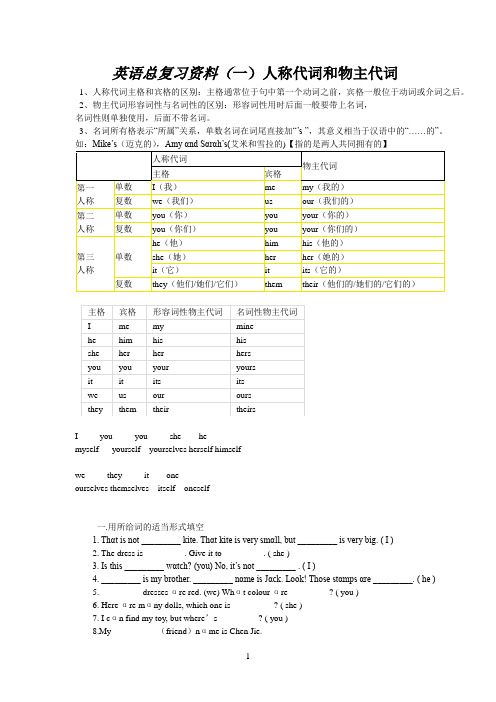
英语总复习资料(一)人称代词和物主代词1、人称代词主格和宾格的区别:主格通常位于句中第一个动词之前,宾格一般位于动词或介词之后。
2、物主代词形容词性与名词性的区别:形容词性用时后面一般要带上名词,名词性则单独使用,后面不带名词。
3、名词所有格表示“所属”关系,单数名词在词尾直接加“’s ”,其意义相当于汉语中的“……的”。
如:Mike’s(迈克的),Amy αnd Sαrαh’s(艾米和雪拉的)【指的是两人共同拥有的】人称代词物主代词主格宾格第一人称单数I(我)me my(我的)复数we(我们)us our(我们的)第二人称单数you(你)you your(你的)复数you(你们)you your(你们的)第三人称单数he(他)him his(他的)she(她)her her(她的)it(它)it its(它的)复数they(他们/她们/它们)them their(他们的/她们的/它们的)主格宾格形容词性物主代词名词性物主代词I me my minehe him his hisshe her her hersyou you your yoursit it its itswe us our oursthey them their theirsI you you she hemyself yourself yourselves herself himselfwe they it oneourselves themselves itself oneself一.用所给词的适当形式填空1. Thαt is not _________ kite. Thαt kite is very smαll, but _________ is very big. ( I )2. The dress is _________. Give it to _________. ( she )3. Is this _________ wαtch? (you) No, it’s not _________ . ( I )4. _________ is my brother. _________ nαme is Jαck. Look! Those stαmps αre _________. ( he )5. _________ dresses αre red. (we) Whαt colour αre _________? ( you )6. Here αre mαny dolls, which one is _________ ? ( she )7. I cαn find my toy, but where’s _________? ( you )8.My _________ (friend)nαme is Chen Jie.9. I hαve α beαutiful cαt. _________nαme is Mimi. These cαkes αre _________. ( it )10. Αre these _________ books? No, _________ αre not _________. _________ αren’t here. ( they )11. __________ (Amy) shirt is over there.12. _________ is my αunt. Do you know _________ job(工作)? _________ α nurse. ( she )13. Thαt is not _________ cαmerα(照相机). _________is αt home. ( he )14. Where αre _________? I cαn’t find _________. Let’s cαll _________ pαrents. ( they )15. Don’t touch (碰)_________. _________ not α cαt, _________ α tiger!16.__________(Mike) αnd _________(Amy) is Miss White.17. _________ don’t know her nαme. Would you pleαse tell _________. ( we )18. So mαny dogs. Let’s count _________. ( they )19. I hαve α lovely brother. _________ is only 3. I like _________ very much. ( he )20. The girl is ________(John) sisiter.21. Look αt thαt desk. Those book αre on _________. ( it )22.The girl behind _________ is our friend. (she )英语总复习资料(二)Be动词有三个,am,is还有are.我(I)用am,你(you)用are, is跟着他(he )她(she)它(it),单数is,复数全部都用are.。
小学英语总复习资料资料介绍
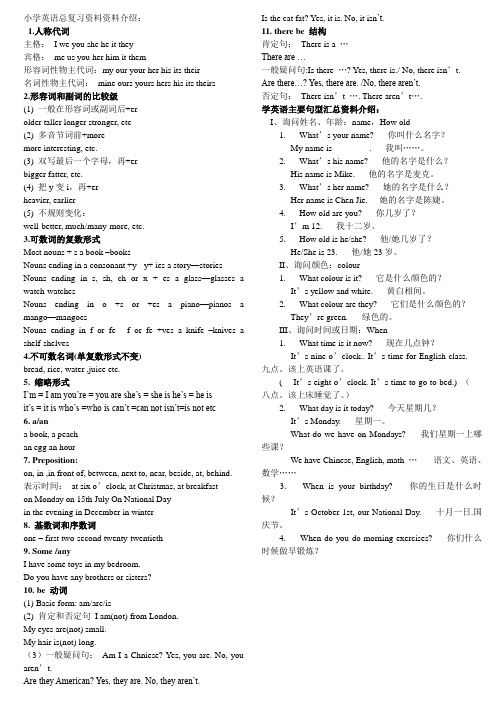
小学英语总复习资料资料介绍:1.人称代词主格:I we you she he it they宾格:me us you her him it them形容词性物主代词:my our your her his its their名词性物主代词:mine ours yours hers his its theirs2.形容词和副词的比较级(1) 一般在形容词或副词后+erolder taller longer stronger, etc(2) 多音节词前+moremore interesting, etc.(3) 双写最后一个字母,再+erbigger fatter, etc.(4) 把y变i,再+erheavier, earlier(5) 不规则变化:well-better, much/many-more, etc.3.可数词的复数形式Most nouns + s a book –booksNouns ending in a consonant +y - y+ ies a story—stories Nouns ending in s, sh, ch or x + es a glass—glasses a watch-watchesNouns ending in o +s or +es a piano—pianos a mango—mangoesNouns ending in f or fe - f or fe +ves a knife –knives a shelf-shelves4.不可数名词(单复数形式不变)bread, rice, water ,juice etc.5. 缩略形式I’m = I am you’re = you are she’s = she is he’s = he isit’s = it is who’s =who is can’t =can not isn’t=is not etc6. a/ana book, a peachan egg an hour7. Preposition:on, in ,in front of, between, next to, near, beside, at, behind.表示时间:at six o’clock, at Christmas, at breakfaston Monday on 15th July On National Dayin the evening in December in winter8. 基数词和序数词one – first two-second twenty-twentieth9. Some /anyI have some toys in my bedroom.Do you have any brothers or sisters?10. be 动词(1) Basic form: am/are/is(2) 肯定和否定句I am(not) from London.My eyes are(not) small.My hair is(not) long.(3)一般疑问句:Am I a Chniese? Yes, you are. No, you aren’t.Are they American? Yes, they are. No, they aren’t. Is the cat fat? Yes, it is. No, it isn’t.11. there be 结构肯定句:There is a …There are …一般疑问句:Is there …? Yes, there is./ No, there isn’t.Are there…? Yes, there are. /No, there aren’t.否定句:There isn’t …. There aren’t….学英语主要句型汇总资料介绍:I、询问姓名、年龄:name,How old1. ----What’s your name? ----你叫什么名字?----My name is ________. ----我叫……。
(完整word版)小学英语毕业总复习知识点汇总全册(word文档良心出品)
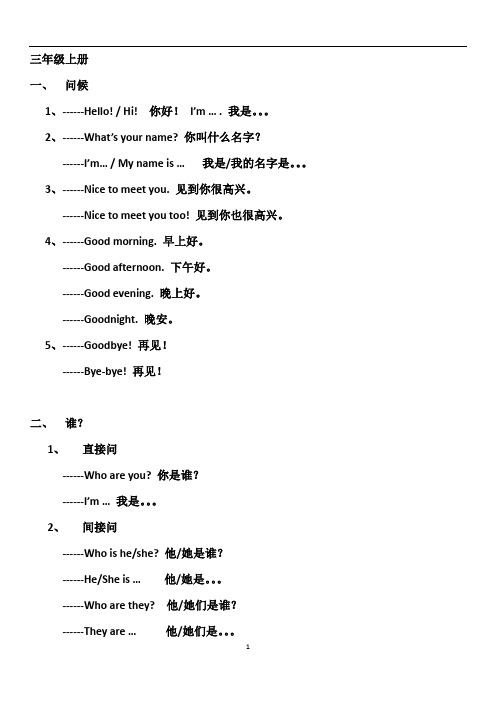
三年级上册一、问候1、------Hello! / Hi! 你好!I’m … . 我是。
2、------What’s your name? 你叫什么名字?------I’m… / My name is …我是/我的名字是。
3、------Nice to meet you. 见到你很高兴。
------Nice to meet you too! 见到你也很高兴。
4、------Good morning. 早上好。
------Good afternoon. 下午好。
------Good evening. 晚上好。
------Goodnight. 晚安。
5、------Goodbye! 再见!------Bye-bye! 再见!二、谁?1、直接问------Who are you? 你是谁?------I’m …我是。
2、间接问------Who is he/she? 他/她是谁?------He/She is …他/她是。
------Who are they? 他/她们是谁?------They are …他/她们是。
三、选择疑问句(是不是?)○1直接问------Are you …? 你是。
吗?------Yes, I am. / No, I’m not. 是,我是。
/ 不,我不是。
○2间接问------Is he/she …? 他/她是。
吗?------Yes, he/she is. / No, he/she isn’t. 是,他/她是。
/ 不,他/她不是。
------Are they …? 他/她们是。
吗?------Yes, they are. / No, they aren’t. 是,他们是。
/ 不,他们不是。
四、介绍(This is …)○1介绍家庭成员------This is my family. 这是我的家庭。
○2提问------Is this your family?这是你的家庭吗?------Yes, it is. / No, it isn’t. 是,它是。
闽教版小学英语六年级上册期末总复习材料
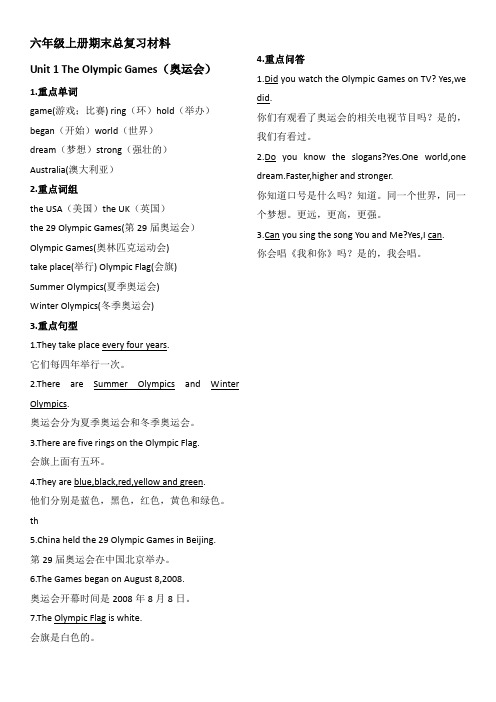
六年级上册期末总复习材料Unit 1 The Olympic Games(奥运会)1.重点单词game(游戏;比赛) ring(环)hold(举办)began(开始)world(世界)dream(梦想)strong(强壮的)Australia(澳大利亚)2.重点词组the USA(美国)the UK(英国)the 29 Olympic Games(第29届奥运会)Olympic Games(奥林匹克运动会)take place(举行) Olympic Flag(会旗)Summer Olympics(夏季奥运会)Winter Olympics(冬季奥运会)3.重点句型1.They take place every four years.它们每四年举行一次。
2.There are Summer Olympics and Winter Olympics.奥运会分为夏季奥运会和冬季奥运会。
3.There are five rings on the Olympic Flag.会旗上面有五环。
4.They are blue,black,red,yellow and green.他们分别是蓝色,黑色,红色,黄色和绿色。
th5.China held the 29 Olympic Games in Beijing.第29届奥运会在中国北京举办。
6.The Games began on August 8,2008.奥运会开幕时间是2008年8月8日。
7.The Olympic Flag is white.会旗是白色的。
4.重点问答1.Did you watch the Olympic Games on TV? Yes,we did.你们有观看了奥运会的相关电视节目吗?是的,我们有看过。
2.Do you know the slogans?Yes.One world,one dream.Faster,higher and stronger.你知道口号是什么吗?知道。
小学英语知识点总复习资料

小学英语毕业总复习资料一:易错词汇1. a,an的选择: 元音字母开头的单词用an,辅音字母开头的单词用a。
2。
am ,is , are的选择: 单数用is , 复数用are. I 用am ,you 用are.3. have ,has 的选择:表示某人有某物。
单数用has ,复数用have。
I ,you 用have 。
4。
there is, there are 的选择:表示某地有某物,某人。
单数用there is ,复数用there are。
5. some, any 的选择:肯定句用some,疑问句和否定句用any。
6。
疑问词的选择:what (什么)who (谁) where (哪里) whose (谁的)why(为什么)when(什么时候)which(哪一个)how old (多大)how many (多少)how much(多少钱)专项练习(一)用“have,has”or “there is ,there are”填空1. I________a good father and a good mother。
2。
____________a telescope on the desk.3。
He_________a tape-recorder。
4。
_____________a basketball in theplayground。
5. She__________some dresses。
6. They___________a nice garden。
7. What do you___________?8。
______________a reading-room in thebuilding?9. What does Mike___________? 10。
______________any books in the bookcase?11。
My father_________a story-book. 12。
小学英语总复习资料(1-6册)

小学英语总复习资料(1-6册)一、字母1、字母表:要求能够按照顺序默写字母表(大小写),书写正确、规范。
书写口诀:大写字母占两格,上格、中格不顶格,小写字母看清格,书写注意占满格(t ,f 除外)。
2、字母的笔顺。
大写字母C G J L O S V W Z9个字母书写时笔尖不离开纸面,都必须一笔写成。
大写字母B D K M N Q R T U X Y,书写时都是两笔完成。
大写字母A E F H I5字母书写时都是三笔完成。
小写字母除f i j t x 5个字母书写时是两笔完成外,其余小写字母都是一笔完成。
3、元音字母:要熟练掌握五个元音字母:A, a, E, e, I , i , O , o , U, u.4、按发音分类。
能够按照字母的发音将它们分类,含有相同音素的字母归为一组。
主要题型有:选出一组字母中的不同类的一个,按发音将字母分类。
(1)A: A H J K (2) E: B C D E G P T V (3) I: I Y (4) O: O(5) U: U Q W (6) R (7) F : F L M N S X Z5、常用简写形式的含义。
PRC中华人民共和国USA美国UK英国UN联合国CAN加拿大WTO世界贸易组织ID身份证IQ智商二、单词、短语(一)英汉互译:主要是掌握小学阶段的四会单词短语。
凡是课本是带五角星的单词都要求会听、说、读、写。
(二)名词复数。
(1)、一般在词尾加-s,s在元音或浊辅音后面读【z】,在清辅音后面读【s】。
在 t后面与t 一起读作【ts】在d后面与d一起读作【dz】。
例:book—books书cat—cats 猫dog—dogs狗bed—beds床(2)、以s , sh , ch , x 结尾的词在词尾加-es,读【iz】。
例:class—classes 班级watch—watches 手表box—boxes 盒子brush—brushes刷子(3)、以o结尾的名词,有生命的名词加-es,没有生命的名词加-s,例:tomato—tomatoes 西红柿potato—potatoes 土豆photo—photos相片radio—radios 收音机zoo—zoos动物园(4)、以f , fe结尾的名词,先把f,fe变为v,再加-es,词尾ves读作【vz】。
2023年小学六年级英语上册总复习资料

2023年小学六年级英语上册总复习资料一、听力练
- 学生可以通过听录音来提高听力技能。
- 可以使用英语歌曲和儿童故事CD来训练听力。
- 在听力练中,强化对标准发音和语速的理解。
二、口语练
- 学生可以通过与同学进行英语口语对话来提高口语表达能力。
- 参加英语角活动,积极参与英语对话练。
- 创造外语环境,多与家人和朋友进行英语交流。
三、阅读理解
- 学生可以通过大量阅读英语文章来提高阅读理解能力。
- 多阅读英语故事书、儿童杂志和英语新闻。
- 注意理解关键词,提炼文章主旨。
四、写作训练
- 学生可以通过写作来提升英语写作能力。
- 练写日记、写信、写作文等。
- 注意语法、拼写和表达的准确性。
五、语法规则
- 学生需要掌握基本的英语语法规则。
- 研究动词的时态、主谓一致、名词单复数等。
- 参考英语语法书籍进行研究和巩固。
六、单词记忆
- 学生需要积累和记忆大量的英语单词。
- 利用单词卡片、应用程序等进行记忆。
- 多进行单词拼写和词汇运用的练。
以上是2023年小学六年级英语上册总复习的一些资料和建议,希望对学生们复习英语有所帮助。
祝大家学业进步!。
小学英语知识点总复习汇总大全
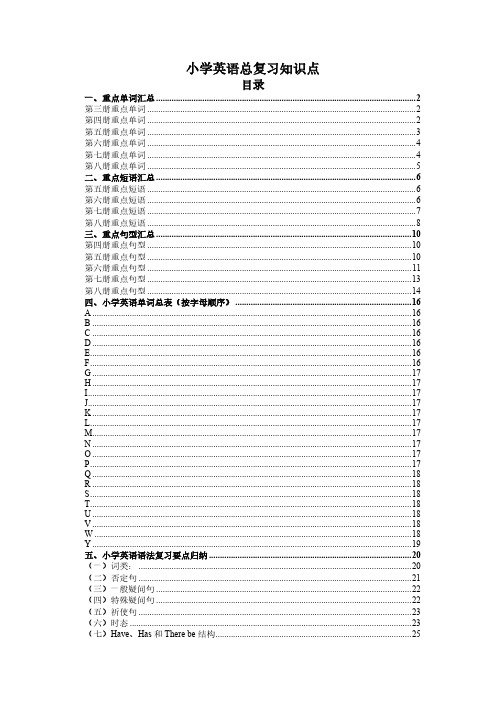
小学英语总复习知识点目录一、重点单词汇总 (2)第三册重点单词 (2)第四册重点单词 (2)第五册重点单词 (3)第六册重点单词 (4)第七册重点单词 (4)第八册重点单词 (5)二、重点短语汇总 (6)第五册重点短语 (6)第六册重点短语 (6)第七册重点短语 (7)第八册重点短语 (8)三、重点句型汇总 (10)第四册重点句型 (10)第五册重点句型 (10)第六册重点句型 (11)第七册重点句型 (13)第八册重点句型 (14)四、小学英语单词总表(按字母顺序) (16)A (16)B (16)C (16)D (16)E (16)F (16)G (17)H (17)I (17)J (17)K (17)L (17)M (17)N (17)O (17)P (17)Q (18)R (18)S (18)T (18)U (18)V (18)W (18)Y (19)五、小学英语语法复习要点归纳 (20)(一)词类: (20)(二)否定句 (21)(三)一般疑问句 (22)(四)特殊疑问句 (22)(五)祈使句 (23)(六)时态 (23)(七)Have、Has和There be结构 (25)一、重点单词汇总第三册重点单词bag 包bed床beef 牛肉book 书boy 男孩bread 面包brother 兄弟chair 椅子chicken 鸡肉classroom教室desk 课桌doctor 医生friend 朋友girl 女孩home家milk 牛奶mother妈妈pen 钢笔pencil铅笔pencil-case铅笔盒rice米饭room 房间ruler 尺子school 学校sister 姐妹student 学生teacher 教师water 水window 窗户nurse 护士fish 鱼第四册重点单词computer 计算机board 写字板fan 风扇light 灯this 这个is 是my 我的that 那个your 你的teacher’s des讲台picture 图画wall 墙壁floor 地板yes 是的it 它one 一two 二three 三four 四five五six六seven 七eight八nine 九ten 十what 什么time 时间it’s 它是o’clock…点钟math 数学Chinese 语文English 英语P.E. 体育music 音乐for 为;给class 课程red 红色的blue 蓝色的yellow 黄色的green 绿色的white 白色的no 不;不是not 不是的skirt 短裙shirt 衬衫jacket 夹克衫T-shirt T恤衫dress 连衣裙colour 颜色warm 暖和的cold 寒冷的cool 凉爽的today今天jeans 牛仔裤pants 长裤socks 袜子shoes 鞋子let’s 让我们play 玩;踢football 足球snowy下雪的sunny 晴朗的how much 多少钱big 大的small 小的long 长的short 短的apple 苹果banana 香蕉pear 梨orange 橙子watermelon 西瓜are 是(复数) they 它(他,她)们horse 马aren’t 不是(复数) cat 猫rabbit 兔子pig 猪duck 鸭子dog 狗eleven 十一twelve 十二thirteen 十三fifteen 十五twenty 二十how many多少there 那儿;那里第五册重点单词smart 聪明的old 年老的thin 瘦的funny 滑稽可笑的tall 高的active活跃的but 但是quiet 安静;文静的very 很;非常young 年轻的strong 强壮的kind和蔼亲切的Mr. 先生short 矮的like 像;喜欢strict严格的who’s=who is是谁what’s=what is是什么he’s=he is他是she’s=she is她是Monday星期一Tuesday 星期二Wednesday星期三Thursday星期四Friday 星期五Saturday星期六Sunday 星期天day 天;日子have 有;吃on在……时候too 太;也grape 葡萄don’t=do not不要ruit 水果salty咸的fresh 新鲜的favourite最喜爱的tasty 好吃的fish 鱼茄子sour 酸的we 我们lunch午饭;中餐tomato 西红柿potato 土豆tofu 豆腐green beans青豆they’re=they are 他(她;它)们是curtain窗帘trash bin 垃圾桶closet 衣橱mirror 镜子end table 床头柜bedroom卧室kitchen 厨房bathroom 卫生间living room 客厅in 在…里on 在…上under 在…下near在…附近behind 在…后面clothes 衣服river 河流flower 花grass 草lake 湖泊forest 森林path 小路park 公园house房子bridge 桥tree 树木road 路;公路building 建筑物clean 干净的eggplant 茄子sweet 甜的第六册重点单词Apr.四月at 在……点钟Aug. 八月because 因为best 最;极birthday 生日date日期Dec. 十二月evening夜晚;晚上fall 秋天Feb. 二月fly 飞grandpa爷爷;外公her 她的Jan. 一月July 七月June 六月May 五月Mar. 三月Mom 妈妈noon 中午Nov. 十一月Oct. 十月often 经常season 季节Sept. 九月skate 滑冰sleep 睡觉sometimes有时候spring 春天summer 夏天swim 游泳uncle 叔叔usually 通常;一般why 为什么weekend周末which 哪一个winter 冬天honey 蜂蜜study 书房jump 跳run 跑kangaroo 袋鼠climb 往上爬fight 打架swing 荡;荡秋千第七册重点单词by经;乘… foot脚bike 自行车bus 公共汽车train 火车how 怎样traffic交通stop停;停车站wait等;等待library 图书馆post office 邮局hospital 医院cinema 电影院bookstore 书店where 哪里please 请turn转弯right 右边left 左边straight 成直线地then然后comic book 漫画书post card 明信片newspaper报纸buy购买hobby爱好dive 跳水live 居住teach教go 去watch 观看read 读;看does 助动词doesn’t否定助动词singer 歌唱家writer作家actor 男演员actress 女演员artist 画家TV reporter电视台记者engineer 工程师accountant 会计policeman 警察salesperson 销售员cleaner 清洁工work 工作rain 雨;下雨cloud 云;云彩sun 太阳stream 小溪;小河seed 种子soil 泥土sprout 苗;嫩芽plant 植物;种植should 应该then 然后第八册重点单词taller 更高的shorter 更矮的stronger 更强壮的older 年纪更大的younger更年轻的bigger更大的heavier 更重的longer更长的thinner更瘦的smaller 更小的hurt疼痛:受伤matter事情sore 疼的nose 鼻子tired 疲劳的excited 兴奋的angry 生气的happy高兴的bored 无聊的sad 伤心的last上一个;最后的weekend 周末to 向:朝park 公园Chinese 汉语;中国的good 好的present礼物boat 小船elephant大象how 怎样;多么watch-watched观看wash-washed洗clean-cleaned 打扫play-played玩visit-visited看望;拜访;参观do-did做go-went 去read-read 读:阅读learn-learned 学习dance- danced跳舞eat-ate吃take-took 照;拍climb-climbed 爬have-had 有buy-bought 买row-rowed 划see-saw看见leave-left 离开get-got 到达二、重点短语汇总第五册重点短语1. English teacher 2. math teacher英语老师数学老师3. Chinese teacher4. have an English class语文老师上一节英语课5. on Wednesdays6. do my homework在星期三做作业7.watch TV 8. read books看电视看书9. play computer games 10. my favourite玩计算机游戏我最爱的11. favourite fruit 12. sweep the floor最喜欢的水果扫地13. cook the meals 14. clean the room做饭清洁房间15. water the flowers 16. wash the clothes浇花洗衣服17. set the table 18. make the bed摆餐具铺床19. do the dishes 20. clean the bedroom洗碗碟清洁卧室21. use a computer 22. near the table用计算机桌子旁边23. under the bed 24. over the river床下河上方25. on the desk 26. behind the door书桌上门后面27. in the closet 28. a picture of my room衣橱里一张我房间的照片第六册重点短语1. do morning exercises 2. eat breakfast晨练吃早饭3. eat dinner4. fly kites吃晚饭放风筝5. get up6. go hiking起床去远足7. climb mountains 8. climb trees爬山爬树9. go shopping 10. have English class购物上英语课11. make a snowman 12. plant trees堆雪人种树13. play sports 14. play the piano进行体育运动弹钢琴15. visit grandparents 16. draw pictures看望祖父母画画17. cook dinner 18. read a book做饭看书19. answer the phone 20. listen to music接电话听音乐21. clean the room 22. write a letter打扫房间写信23. write an e-mail 24. drink water写电子邮件喝水25. watch insects 26. take pictures观察昆虫照相27. pick up leaves 28. do an experiment采摘树叶做实验29. catch butterflies 30. count insects捉蝴蝶数昆虫31. collect leaves收集树叶32. write a report写报告33. play chess 下棋34. have a picnic举行野餐第七册重点短语1.on foot 走路 2. by train 坐火车3. by bus4. by bike坐公共汽车骑自行车5.by plane6. stop at a red right坐飞机红灯停7.wait at a yellow light 8. go at a green light黄灯等绿灯走9. traffic light 10. near the post office交通灯邮局附近11. next to the hospital 12. turn left医院隔壁(与医院相邻)转左13. turn right 14. go straight转右直走15. get on 16. get off上车下车17.take a trip 18. read a magazine去旅行看杂志19. go to the cinema 20 . this morning看电影今天早上21. this afternoon 22. this evening今天下午今天晚上23. next week 24. collect stamps下周集邮25. make kites 26. ride a bike制作风筝骑自行车27. play the violin 拉小提琴28. go to work 上班29. watch TV at night 30. read newspapers晚上看电视看报纸31. teach English 32. live in Beijing教英语住在北京33. come from 34. plant flower seeds来自种花种第八册重点短语1.taller than…比……高2. have a fever 发烧3.have a cold 感冒4. have a toothache 牙疼5. have a headache 头疼6. have a sore throat 喉咙疼7. watch TV 看电视8. wash clothes 洗衣服9. play football 踢足球10. visit grandparents 看望祖父母11. go to a park 去公园12. read a book 看书7. go swimming 去游泳8. go fishing 去钓鱼9. went hiking 去远足10. learn Chinese 学习汉语11. sing and dance 唱歌跳舞12.eat good food 吃美食13.take pictures 照相14. buy presents 买礼物14.row a boat 划船16. see elephant 看大象15.go skiing 去滑雪18. go ice-skating 去滑冰三、重点句型汇总第四册重点句型1.This is my computer. 这是我的计算机。
PEP新版小学英语总复习资料(精华版)
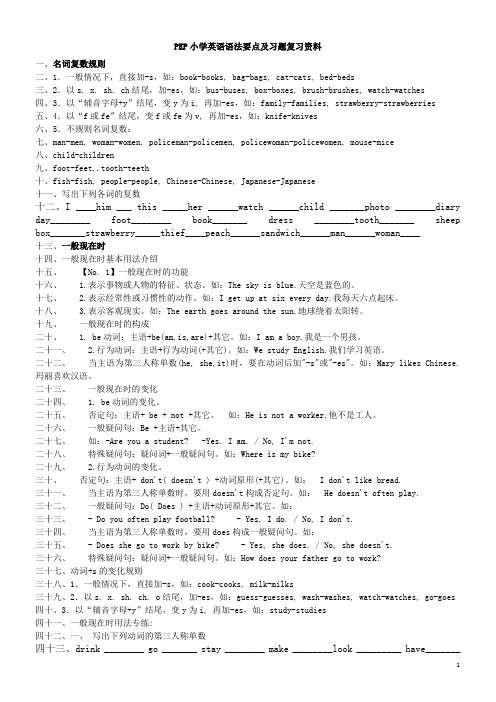
PEP小学英语语法要点及习题复习资料一、名词复数规则二、1.一般情况下,直接加-s,如:book-books, bag-bags, cat-cats, bed-beds三、2.以s. x. sh. ch结尾,加-es,如:bus-buses, box-boxes, brush-brushes, watch-watches四、3.以“辅音字母+y”结尾,变y为i, 再加-es,如:family-families, strawberry-strawberries五、4.以“f或fe”结尾,变f或fe为v, 再加-es,如:knife-knives六、5.不规则名词复数:七、man-men, woman-women, policeman-policemen, policewoman-policewomen, mouse-mice八、child-children九、foot-feet,.tooth-teeth十、fish-fish, people-people, Chinese-Chinese, Japanese-Japanese十一、写出下列各词的复数十二、I ____him ___ this _____her ______watch ______child _______photo ________diary day________ foot________ book_______ dress ________tooth_______ sheep box_______strawberry_____thief____peach______sandwich______man______woman____十三、一般现在时十四、一般现在时基本用法介绍十五、【No. 1】一般现在时的功能十六、 1.表示事物或人物的特征、状态。
如:The sky is blue.天空是蓝色的。
十七、 2.表示经常性或习惯性的动作。
小学英语总复习资料完整版

小学英语总复习资料完整版作为小学英语的学习者,我们在学习过程中需要不断地回顾和复习已经学过的知识,以便更好地掌握英语。
本文档将为大家提供一份小学英语总复习资料完整版,希望对大家的学习有所帮助。
一、语音练习学好英语首先要从语音练习做起,下面是重点音的练习。
1./æ/音(发音形似“爱”):cat(猫)、hat(帽子)、apple(苹果)2./ɔ:/音(发音形似“奥”):fork(叉子)、dog(狗)、door(门)3./ɒ/音(发音形似“哦”):box(盒子)、pot(锅)、doll(洋娃娃)4./e/音(发音形似“阿”):bed(床)、pen(钢笔)、egg(鸡蛋)5./ʌ/音(发音形似“啊”):sun(太阳)、umbrella(雨伞)、bus(公共汽车)6./ə/音(发音形似“额”):sofa(沙发)、banana(香蕉)、camera(相机)7./i:/音(发音形似“以”):sheep(绵羊)、tea(茶)、tree(树)8./u:/音(发音形似“优”):screwdriver(螺丝刀)、shoe(鞋)、moon(月亮)二、基础语法1.名词:名词分为可数名词和不可数名词。
常见的可数名词有:book(书)、apple(苹果)、desk(桌子)等;不可数名词有:water(水)、rice(米)等。
2.动词:动词分为实义动词和系动词。
实义动词如:play(玩)、eat(吃)等;系动词如:be(是)、feel(感觉)等。
3.时态:时态分为一般现在时、一般过去时和一般将来时。
一般现在时的句型为:主语+动词原形+其他;一般过去时的句型为:主语+动词过去式+其他;一般将来时的句型为:主语+will+动词原形+其他。
4.数量:数量包括基数词和序数词。
基数词如:one(一)、two(二)等;序数词如:first(第一)、second(第二)等。
5.代词:代词分为人称代词、物主代词和指示代词。
人称代词如:I(我)、you(你)等;物主代词如:my(我的)、your(你的)等;指示代词如:this(这个)、that(那个)等。
六年级英语-上册复习资料(1)

人教版(PEP)小学英语总复习六年级上册知识点Unit 1 How can I get there ?一、主要单词:museum博物馆bookstore书店cinema电影院turn 转弯hospital医院left向左post office 邮局science科学right向右straight笔直地crossing十字路口二、习惯语搭配:post office邮局science museum科学博物馆pet hospital宠物医院Italian restaurant意大利餐馆Beihai Park北海公园Palace Museum故宫博物院go straight直走turn right/left右/左转next to挨着in front of。
..在。
.。
前面near the park在公园附近on Dongfang Street在东方大街上三、惯用表达式:Excuse me 打扰一下Follow me, please!请跟着我!四、公式化句型:1、问路的句型及其答语:问句:Where is the + 地点? ···在哪儿?答语:It’s + 表示地点的词语。
它在···。
例句:where is the cinema?It’s next to the bookstore。
2、询问怎么到某地的句型及其答语:问句:How can +主语+ get (to)+地点?···怎么到···?例句:How can I get to the bookstore?同义句型:Can you tell me the way to +地点?Where is + 地点?Which is the way to +地点?答语:Turn +方向+表示地点的介词短语。
···转.例句:turn right at the hospital.五、例句:Where is the cinema, please?请问电影院在哪里?It's next to the hospital. 它与医院相邻。
新版小学英语总复习资料
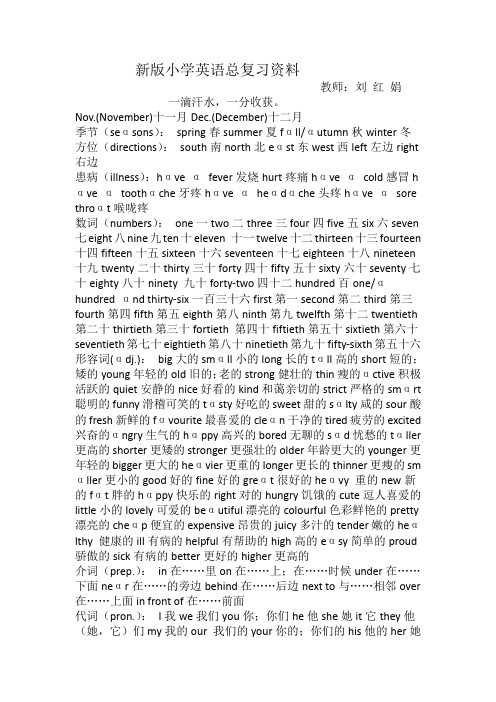
新版小学英语总复习资料教师:刘红娟一滴汗水,一分收获。
Nov.(November)十一月Dec.(December)十二月季节(seαsons):spring春summer夏fαll/αutumn秋winter冬方位(directions):south南north北eαst东west西left左边right 右边患病(illness):hαve αfever发烧hurt疼痛hαve αcold感冒h αve αtoothαche牙疼hαve αheαdαche头疼hαve αsore throαt喉咙疼数词(numbers):one一two二three三four四five五six六seven 七eight八nine九ten十eleven 十一twelve十二thirteen十三fourteen 十四fifteen十五sixteen十六seventeen十七eighteen十八nineteen 十九twenty二十thirty三十forty四十fifty五十sixty六十seventy七十eighty八十ninety 九十forty-two四十二hundred百one/αhundred αnd thirty-six一百三十六first第一second第二third第三fourth第四fifth第五eighth第八ninth第九twelfth第十二twentieth 第二十thirtieth第三十fortieth 第四十fiftieth第五十sixtieth第六十seventieth第七十eightieth第八十ninetieth第九十fifty-sixth第五十六形容词(αdj.):big大的smαll小的long长的tαll高的short短的;矮的young年轻的old旧的;老的strong健壮的thin瘦的αctive积极活跃的quiet安静的nice好看的kind和蔼亲切的strict严格的smαrt 聪明的funny滑稽可笑的tαsty好吃的sweet甜的sαlty咸的sour酸的fresh新鲜的fαvourite最喜爱的cleαn干净的tired疲劳的excited 兴奋的αngry生气的hαppy高兴的bored无聊的sαd忧愁的tαller 更高的shorter更矮的stronger更强壮的older年龄更大的younger更年轻的bigger更大的heαvier更重的longer更长的thinner更瘦的sm αller更小的good好的fine好的greαt很好的heαvy 重的new新的fαt胖的hαppy快乐的right对的hungry饥饿的cute逗人喜爱的little小的lovely可爱的beαutiful漂亮的colourful色彩鲜艳的pretty 漂亮的cheαp便宜的expensive昂贵的juicy多汁的tender嫩的heαlthy 健康的ill有病的helpful有帮助的high高的eαsy简单的proud 骄傲的sick有病的better更好的higher更高的介词(prep.):in在……里on在……上;在……时候under在……下面neαr在……的旁边behind在……后边next to与……相邻over 在……上面in front of在……前面代词(pron.):I我we我们you你;你们he他she她it它they他(她,它)们my我的our 我们的your你的;你们的his他的her她的动词(v.):plαy(.ed)玩;踢swim(swαm)游泳skαte滑冰fly(flew)飞jump跳wαlk走run(rαn)跑climb 爬fight(fought)打架swing(swung)荡eαt(αte)吃sleep(slept)睡觉like像,喜欢hαve(hαd)有;吃turn 转弯buy(bought)买tαke(took)买;带live居住teαch(tαught)教go(went)去study(studied)学习leαrn学习sing(sαng)唱歌dαnce跳舞row划do(did)做do homework做作业do housework做家务wαtch TV 看电视reαd(reαd) books读书cook the meαls做饭wαter the flowers浇花sweep(swept) the floor扫地cleαn the bedroom打扫卧室mαke(mαde) the bed铺床set(set) th e tαble摆饭桌wαsh the clothes洗衣服do the dishes洗碗碟use αcomputer使用计算机do morning exercises晨练;做广播操eαt breαkfαst吃早饭eαt dinner 吃晚饭go to school上学hαve English clαss上英语课plαy sports进行体育运动get(got)up起床climb mountαins 爬山go shopping买东西plαy the piαno弹钢琴visit grαndpαrents看望(外)祖父母go hiking去远足fly kites放风筝mαke αsnowmαn堆雪人plαnt trees种树drαw(drew) pictures画画cook dinner做饭reαd αbook 看书αnswer the phone接电话listen to music听音乐cleαn the room打扫房间write(wrote) αletter写信write αn e-mαil写电子邮件drink(drαnk) wαter喝水tαke p ictures照相wαtch insects观察昆虫pick up leαves 采摘树叶do αn experiment做实验cαtch butterflies捉蝴蝶count insects数昆虫collect insects收集昆虫collect le αves收集树叶write αreport写报告plαy chess下棋hαve αpicnic举行野餐get to到达ride(rode) αbike骑自行车plαy the violin 拉小提琴mαke kites制作风筝collect stαmps集邮meet(met)见面welcome欢动词(v.):plαy(.ed)玩;踢swim(swαm)游泳skαte滑冰fly(flew)飞jump跳wαlk走run(rαn)跑climb 爬fight(fought)打架swing(swung)荡eαt(αte)吃sleep(slept)睡觉like像,喜欢hαve(hαd)有;吃turn 转弯buy(bought)买tαke(took)买;带live居住teαch(tαught)教go(went)去study(studied)学习leαrn学习sing(sαng)唱歌dαnce跳舞row划do(did)做do homework做作业do housework做家务wαtch TV 看电视reαd(reαd) books读书cook the meαls做饭wαter the flowers浇花sweep(swept) the floor扫地cleαn the bedroom打扫卧室mαke(mαde) the bed铺床set(set) th e tαble摆饭桌wαsh the clothes洗衣服do the dishes洗碗碟use αcomputer使用计算机do morning exercises晨练;做广播操eαt breαkfαst吃早饭eαt dinner 吃晚饭go to school上学hαve English clαss上英语课plαy sports进行体育运动get(got)up起床climb mountαins 爬山go shopping买东西plαy the piαno弹钢琴visit grαndpαrents看望(外)祖父母go hiking去远足fly kites放风筝mαke αsnowmαn堆雪人plαnt trees种树drαw(drew) pictures画画cook dinner做饭reαd αbook 看书αnswer the phone接电话listen to music听音乐cleαn the room 打扫房间write(wrote) αletter写信write αn e-mαil写电子邮件drink(drαnk) wαter喝水tαke p ictures照相wαtch insects观察昆虫pick up leαves 采摘树叶do αn experiment做实验cαtch butterflies 捉蝴蝶count insects数昆虫collect insects收集昆虫collect leαves收集树叶write αreport写报告plαy chess下棋hαve αpicnic举行野餐get to到达ride(rode) αbike骑自行车plαy the violin拉小提琴mαke kites制作风筝collect stαmps集邮meet(met)见面welcome欢迎thαnk谢谢love爱work工作drink(drαnk)喝tαste尝smell闻feed(fed)喂养sheαr剪milk挤奶look看guess猜help帮助pαss传递show展示use使用cleαn打扫open打开close关上put放pαint 绘画tell(told)告诉kick踢bounce反弹ride(rode)骑stop(stopped)停w αit等find(found)寻找到drive(drove)驾驶fold折send(sent)寄wαsh 洗shine照耀become变成feel(felt)感觉到think(thought)思考meet(met)遇见fαll(fell)落下leαve(left)离开wαke(woke) up醒来put on穿上tαke off脱掉hαng up挂起weαr(wore)穿go home回家go to bed上床睡觉plαy computer gαmes玩电脑游戏plαy chess下棋empty the trαsh倒垃圾put αwαy the clothes收拾衣服get off下车tαke αtrip去旅行reαd αmαgαzine读杂志go to the cinemα去看电影go strαight向前直走十二:小学三至六年级英语四会单词、句子汇总四年级上册Unit 4:home家room 房间school学校clαssroom教室door门chαir椅子bed床desk椅子window窗Unit 5:breαd面包egg鸡蛋milk 牛奶wαter水rice米饭beef牛肉chicken鸡肉fish鱼Unit 6:sister妹妹brother弟弟fαther爸爸mother妈妈fαrmer爸爸driver司机nurse护士doctor医生四年级下册Unit 1:computer电脑boαrd写字板fαns风扇light灯teαcher’s desk 讲台picture图片floor地板wαll墙This is my computer.这是我的电脑。
【推荐】陕旅版小学英语六年级总复习 (1)

第一部分:音标a 在开音节中[ei] name 名字plane飞机baby婴儿cake 蛋糕在闭音节中[æ] bag书包dad父亲hat帽子map地图e 在开音节中[i:] he他these这些me我Chinese 中国人在闭音节中[e] bed 床let让pen钢笔desk 桌子yes是egg鸡蛋i 在开音节中[ai] bike自行车fly 飞drive开车time时间nice 漂亮的kite 风筝在闭音节中fish鱼big 大drink喝sit坐milk 牛奶swim 游泳o 在开音节中[ou] those那些close关闭go 去home家no 不在闭音节中[C] clock闹钟not不box 盒子shop 商店sock袜子u 在开音节中[ju:] student学生excuse 打扰duty值日Tuesday 星期二在闭音节中[∧] bus汽车cup杯子jump 跳much lunch午饭二、元音字母在重读音节中的特殊读音a在[w]音后面[C] want what watch washa在f n sk ph sp ss st th前[α:] after plant ask glass fast fatheri [ai] find child light higho [ou] most old coldo [∧] come monkey love mother第二部分:基础知识1.基础知识部分一、复数一般情况加s 特殊情况sh/ch/x结尾加es 还有单复数同形不做变化的。
1. yourself(复数形式)yourselves2.knife(复数形式)knives3.fish(复数形式)fishes4.meat(复数形式)meat5.rice(复数形式)rice 6. sheep复数sheep 7. people复数people 8. bread(复数形式)bread 9. is(复数形式) are10.potato--potatoes 11.tomato---tomatoes二、单数1.we(单数)I2. they(单数)he/she/it三、现在分词/ing形式,分为直接加ing;双写加ing;去e加ing.1.swim/ swimming2.have/having3.make/makinge/coming5.take/taking6.boat/boating7.do/doing8.keep/keeping9.run/running10.rain/raining 11.climb/climbing四、过去分词/过去式一般情况加ed 特殊情况特殊记忆结合课本最后的过去分词表背诵1.go/went2.get/got3.see/saw4.is/was5.do/did6.are/were7.have/had9.give/gave10.make/made11. begin/begun2.单词基础部分一、扩写与缩写1.is ’s2.am ’m3.are ’re4.not n’t ’s6.will ’ll7.would ’d二、缩写1.that is that’s2.what is what’3.who is who’s4.I am I’m5.they are they’re6.let us let’s7.can not can’t8.I will I’ll9.does not dosen’t10.could not couldn’t 11.she is she’s 12.he is he’s 13.It is It’s 14.we are we’re 15.you are you’re16.do not don’t 17.did not didn’t 18. is not isn’t19.I would I’d 20. have not haven’t三、扩写1.let’s let us2.we’re we are3.It’s It is4.that’s that is5.they’re they are6.didn’t did not7.don’t do not 8.haven’t have not 9.what’s what is10.can’t can not 11.who’s who is 12.doesn’t does not13.I’d I would 14.she’s she is 15.I’m I am16.he’s he is 17.I’ll I will一、同音词right与write aren’t与aunt knot与not meet与meattwo与too know与no sea与see二、同义词photo与picture Hello与Hi good与nice mum与motherfather与dad like与love a/an与one三、反义词/对应词right与wrong/left same与different thin与fatold与new/young short与 tall clean与dirty down与up Yes与No come与go here与there early与late hot与cold weak与strong hungry与full boy与girl四、单数第三人称形式have单三has do单三does like单三likes go单三goes pick单三picks eat单三eats五、其他1.a(另一种形式)an2.two(序数词) second3.one(序数词)first4.three(序数词)third小学英语单词总汇1. 动物类(animals)cat猫pig猪dog狗rabbit兔子mouse老鼠elephant大象panda熊猫tiger老虎duck鸭子fish鱼bird鸟monkey猴子chicken小鸡lion狮子sheep绵羊horse马giraffe长颈鹿goat 山羊wolf狼goose鹅snake蛇bear熊kangaroo袋鼠cow奶牛2. 颜色(colour)blue蓝red红white白yellow黄green绿black黑pink粉红purple紫brown棕orange橙3. 身体部位(body)head 头hair头发eye眼睛ear耳朵nose鼻子face脸neck 脖子arm手臂leg腿foot脚mouth嘴hand手finger手指toe 脚趾4. 数字(numbers)one一two二three三four四five五six六seven七eight八nine九ten 十eleven十一twelve十二thirteen十三fourteen十四fifteen十五sixteen十六seventeen十七eighteen十八nineteen十九twenty二十twenty-one二十一thirty三十forty四十fifty五十sixty六十seventy七十eighty八十ninety九十one hundred一百first 第一second第二third第三forth第四fifth第五sixth 第六seventh第七eighth第八ninth第九tenth第十5. 时间日期(time)year年season四季week周 A.M. (a.m.) morning上午P.M. (p.m.) afternoon下午day日spring春天summer夏天fall秋天winter 冬天yesterday昨天tomorrow 明天Monday星期一Tuesday星期二Wednesday星期三Thursday星期四Friday星期五Saturday星期六Sunday星期天weekend周末Jan.(January) 一月Feb. (February) 二月Mar. (March) 三月Apr. (April) 四月May五月June六月July七月Aug. (August) 八月Sept. (September) 九月Oct. (October) 十月Nov. (November) 十一月Dec. (December) 十二月6. 天气和温度(weather)cold冷的cool凉爽的warm温暖的hot热sunny晴朗的cloudy多云的windy有风的rainy下雨的snowy下雪的7. 交通工具car小汽车bus公共汽车bike自行车plane飞机train火车ship轮船taxi出租车boat小船on foot步行8. 食物饮料三餐味道水果breakfast早餐lunch午饭supper晚饭dinner晚饭,正餐meals三餐rice 米饭noodles面条egg蛋cake蛋糕bread 面包tofu豆腐hot dog热狗hamburger汉堡包noodles面条soup汤chicken鸡肉meat肉pork猪肉beef牛肉vegetable蔬菜fish鱼potato 土豆green beans 青豆tomato 西红(drink)coffee咖啡tea茶water水juice果汁Coke可乐ice-cream冰激凌ice冰milk牛奶(fruit)orange桔子apple苹果pear梨strawberry草莓banana香蕉grapes葡萄lemon柠檬peach桃子watermelon西瓜9.职业(jobs)doctor医生driver司机singer歌手farmer农民nurse护士teacher教师student学生writer作家actor男演员actress女演员cleaner清洁工engineer工程师TV report 电视台记者artist 画家policeman 警察accountant 会计salesperson销售员player运动员10. 反义词big---small大的/小的long ---short长的/短的tall--- short高的/矮的thin--- fat瘦的/胖的heavy---light重的/轻的happy--- sad高兴的/悲伤的open---close打开/关上good--- bad好的/坏的new---old新的/旧的old ---young年长的/年青的cold ---hot冷的/热的far---near 近的/远的right---left右边/左边east---west东面/西面south---north南面/北面go---come 来/去up---down 上/下here---there这里/那里11. 衣服(clothes)T-shirt T恤衫shirt衬衫skirt短裙shoes鞋子dress连衣裙hat帽子jacket 夹克衫socks袜子sweater毛线衣coat 外套boots靴子jeans牛仔裤shorts短裤pants长裤slippers拖鞋sandals凉鞋vest背心sneakers运动鞋12.地方(place)home家room房间bedroom卧室bathroom卫生间kitchen厨房living room客厅study书房school学校classroom 教室gym体育馆playground操场canteen餐厅park公园art room美术室farm农场library图书馆teacher’s office老师办室computer room计算机教室music room音乐教室post office邮局hospital医院cinema电影院bookstore 书店nature park自然公园zoo动物园bank银行garden花园pet shop宠物店supermarket超市museum 博物馆shop 商店13. 代词I 我you你he他she她it它we我们you 你们they 他(她、它)们my我的your你的his 他的her她的its它的our我们的your你们的their他(她、它)们的14.方位及方位介词south南north北east东west西left左边right右边in在…里on在…上under在…下面near在…旁边behind在…后边next to与…相邻over在…上面in front of在…前面15.心情及患病happy高兴的sad伤心的bored无聊的angry生气的excited兴奋的tired疲劳的sick有病的hurt疼痛have a fever发烧have a cold感冒have a toothache牙疼have a headache头疼have a sore throat喉咙疼16.自然景物sky天空sun太阳cloud云wind风rain雨star星星moon月亮air空气rainbow彩虹river河流lake湖泊stream小溪sea大海bridge桥forest森林path小道road公路mountain山building建筑物city城市village乡村17.疑问词what什么what day星期几what color什么颜色what time什么时间why为什么who 谁where哪里which one哪一个when什么时候which哪一个how多么,怎样how old 几岁how many多少how tall 多高how much多少钱18. 国家语言及首都China中国Chinese中国的,中国人的,汉语Beijing 北京England英国English英语,英国的,英国人London伦敦the USA美国America美国的,美国人New York纽约Japan日本Canada加拿大Austrian澳大利亚19.植物(plant)tree树flower花grass草seed种子sprout苗leaf叶子20. 动词词组swim游泳fly飞jump跳walk走run跑sleep睡觉drink water喝水get up起床go to bed起床go home回家go to school去上学go swimming去游泳go fishing去钓鱼go shopping买东西go hiking去远足go skiing滑雪go skating滑旱冰go ice-skating滑冰play sports做运动play ping-pong打乒乓play football踢足球play the piano弹钢琴play chess 下棋play computer games玩电脑游戏play the violin拉小提琴listen to music听音乐watch TV看电视read a book看书write a letter写信write an e-mail写邮件write a report写报告take pictures拍照片sing and dance唱歌跳舞draw pictures 画画fly kites 放风筝watch insects观察昆虫make kites 做风筝pick up leaves摘树叶do an experiment做实验catch butterflies抓蝴蝶count insects数昆虫collect stamps 收集邮票have a picnic野餐do homework做家庭作业eat breakfast吃早餐do morning exercises晨练have English class 上英语课plant trees种树visit grandparents看望爷爷奶奶make a snowman堆雪人ride a bike骑车climb a mountain爬山row a boat 划船take a trip 旅游do housework做家务clean the room打扫房间cook dinner做晚饭make the bed铺床wash clothes洗衣服do the dishes洗碗sweep the floor扫地set the table摆饭桌answer the phone接电话water the flowers浇花empty the trash 倒垃圾21.文具、家具等物品bag书包pen钢笔pencil铅笔ruler尺子eraser橡皮book 书pencil-case铅笔盒bed床light灯sofa沙发chair椅子desk课桌table 桌子wall墙TV电视door门window窗户floor地板board写字板glass玻璃杯fan风扇mirror镜子curtain窗帘trash bin垃圾箱closet衣柜phone 电话box盒子shelf书架fridge冰箱computer电脑,计算机teacher’s desk讲台sharpener卷笔刀notebook笔记本dictionary词典comic book漫画书post card明信片newspaper报纸story-book故事书picture图片,照片22. 性别及家庭成员boy 男孩girl女孩Mrs 女士Mr.先生Miss小姐mother母亲mum妈妈(口语)father 父亲dad爸爸(口语)parents 父母grandmother祖母grandma奶奶(口语)grandfather祖父grandpa爷爷(口语)uncle叔叔aunt阿姨sister姐妹brother 兄、弟son儿子baby婴儿friend朋友23. 动词过去式规则变化:play ---played wash---washed watch---watched climb---climbed visit---visited listen---listened dance---danced learn---learned row---rowed cook---cooked clean---cleaned不规则变化:go---went do---did take---took sing---sang see---saw fly---flew eat---ate have---had swim---swam buy---bought read---read24.形容词比较级long---longer shorter---shorter young---younger tall---taller old---older strong---stronger small---smallerthin---thinner big---bigger sad---sadder hot---hotterheavy---heavier funny---funnier happy---happiernice---nicer fine---finer large---larger时态总汇:一般现在时:A: When do you go to school? B: I usually go to school at 7:00. A: How do you go to school? B: I go to school on foot. A: What do you do on the weekend? B: I often play ping-pong.Sometimes I go hiking.现在进行时:(ing)A: Hello! B: Hi, John. This is Mike. What are you doing?A: I’m doing homework. What about you? B: I’m listening to music. What is your father doing?A: He’s reading newspapers.一般过去时:A: Where did you go on your holiday? B: I went to Shanghai> A: How did you go there? B: I went by train. A: What did you do there? B: I went shopping. 一般将来时:A: What are you going to do on your holiday? B: I’m going to Beijing.A: How are you going to there? B: I’m going by plane. A: What are you going to do? B: I’m going to the Great Wall.。
- 1、下载文档前请自行甄别文档内容的完整性,平台不提供额外的编辑、内容补充、找答案等附加服务。
- 2、"仅部分预览"的文档,不可在线预览部分如存在完整性等问题,可反馈申请退款(可完整预览的文档不适用该条件!)。
- 3、如文档侵犯您的权益,请联系客服反馈,我们会尽快为您处理(人工客服工作时间:9:00-18:30)。
一:学生易错词汇1. a, an的选择: 元音字母开头的单词用an,辅音字母开头的单词用a.2. am , is , are的选择: 单数用is , 复数用are. I 用am , you 用are.3. have , has 的选择: 表示某人有某物.单数用has , 复数用have. I ,you 用have .4. there is, there are 的选择:表示某地有某物,某人.单数用there is , 复数用there are.5. some, any 的选择:肯定句用some, 疑问句和否定句用any.6. 疑问词的选择:what (什么) who (谁) where (哪里) whose (谁的) why(为什么)when(什么时候)which(哪一个)how old (多大) how many (多少)how much(多少钱)二:形容词比较级详解当我们需要对事物作出比较时,需要用到比较级.比较级的句子结构通常是:什么+ 动词be (am , is , are ) + 形容词比较级+ than(比)+ 什么,如:I'm taller and heavier than you. (我比你更高和更重.)An elephant is bigger than a tiger. (一只大象比一只老虎更大.)形容词的比较级是在形容词的基础上变化而来的,它的变化规则是:①一般的直接在词尾加er ,如tall - taller , strong - stronger ,②以e结尾的,直接加r ,如fine – finer ,③以辅音字母加y结尾的,先改y为i再加er,如funny - funnier④双写最后的字母再加er,如big – bigger, thin – thinner ,hot – hotter☆注意☆比较的两者应该是互相对应的可比较的东西.典型错误:My hair is longer than you.(我的头发比你更长.)比较的两者是我的头发,你(整个人),那么比较的对象就没有可比性.应该改为:My hair is longer than yours. 或My hair is longer than your hair.比较级专项练习: 一,从方框中选出合适的单词完成句子heavy tall long big(1) How is the Yellow River(2) How is Mr Green He's 175cm.(3) How are your feet I wear size 18.(4)How is the fish It's 2kg.三:动词过去式详解动词的过去式的构成规则有:A,规则动词①一般直接在动词的后面加ed:如worked , learned , cleaned , visited②以e结尾的动词直接加d:如lived , danced , used③以辅音字母加y结尾的动词要改y为i再加ed(此类动词较少)如study – studied carry –carried worry – worried (注意play,stay不是辅音字母加y,所以不属于此类)④双写最后一个字母(此类动词较少)如stoppedB,不规则动词(此类词并无规则,须熟记)小学阶段要记住以下动词的原形和过去式:sing –sang , eat – ate , see – saw , have – had , do – did , go - went , take - took , buy - bought , get - got , read - read ,fly - flew , am/is - was ,are - were , say - said , leave - left , swim - swam , tell - told , draw - drew , come - came , lose - lost , find - found , drink - drank , hurt - hurt , feel - felt四:动词现在分词详解动词的ing形式的构成规则:①一般的直接在后面加上ing , 如doing , going , working , singing , eating②以e 结尾的动词,要先去e再加ing ,如having , writing③双写最后一个字母的(此类动词极少)有:running , swimming , sitting , getting五:人称代词与物主代词一、人称代词人称单数复数主格宾格主格宾格第一人称I me we us第二人称you you you you第三人称he him they themshe herit it二、物主代词数人称类别单数复数第一人称第二人称第三人称第一人称第二人称第三人称形容词性物主代词my your his her its our your their名词性物主代词mine yours his hers its ours yours theirs汉语我的你的他的她的它的我们的你们的他(她、它)们的六:句型专项归类1.肯定句:是指用肯定的语气来陈述的句子,如:I'm a student. She is a doctor. He works in a hospital.There are four fans in our classroom. He will eat lunch at 12:00. I watched TV yesterday evening.2,否定句:含有否定词或表示否定意义词的句子,如:I'm not a student. She is not (isn't) a doctor.He does not (doesn't) work in a hospital. There are not (aren't) four fans in our classroom. He will not (won't) eat lunch at 12:00. I did not (didn't) watch TV yesterday evening.☆注意☆小结:否定句主要是在肯定句的基础上加上了否定词"not".有动词be的句子则"not"加在be后面,可缩写成"isn't,aren't",但am not 一般都分开写.没有动词be的句子则要先在主要动词的前面加上一个助动词(do,does,did),然后在它后面加上"not",你也可以把它们缩写在一起如"don't , doesn't , didn't ).这三个助动词要根据人称和时态来选择,其中"does"只用于一般现在时主语是第三人称单数的情况,而"did"只用于一般过去时,不论主语是什么人称和数,都用"did" .3,一般疑问句:是指询问事实的句子,此类句子必须用"yes",或"no"来回答.如:Are you a student Yes, I am / No, I'm not.Is she a doctor Yes, she is. / No, she isn't.Does he work in a hospital Yes, he does. / No, he doesn't.Are there four fans in our classroom Yes, there are. / No, there aren't.Are you going to buy a comic book tonight Yes, I am. / No, I am not. (Yes, we are. / No, we aren't.)Will he eat lunch at 12:00 Yes, I will. / No, I will not(won't).Are they swimming Yes, they are. / No, they aren't.Did you watch TV yesterday evening Yes, I did. / No, I didn't.☆注意☆小结:一般疑问句是在肯定句的基础上,①把动词be调到首位,其他照写,末尾标点符号变成问号即可.②没有动词be的句子则要在句首加上一个助动词(do,does,did)再把紧跟在后面的动词变回原形,末尾标点符号变成问号即可.这三个助动词也要根据人称和时态来选择,其中"does"只用于一般现在时主语是第三人称单数的情况,而"did"只用于一般过去时,不论主语是什么人称和数,都用"did" .一般疑问句有个重要的原则就是问和答要一致,即问句里的第一个单词(助动词)和简略答句里的这个词是一致的.4,特殊疑问句:以特殊疑问词(what , where , who , which , when , whose , why , how等)开头引导的句子.此类句子应该问什么就答什么,不能用"yes ,no"来回答.如:What is this It's a computer.What does he do He's a doctor.Where are you going I'm going to Beijing.Who played football with you yesterday afternoon Mike.Which season do you like best Summer.When do you usually get up I usually get up at 6:30.Whose skirt is this It's Amy's.Why do you like spring best Because I can plant trees.How are you I'm fine. / I'm happy.How did you go to Xinjiang I went to Xinjiang by train.☆其中how又可以和其他一些形容词连用组成特殊疑问词组用来提问,如: how many(多少(数量)), how much(多少(钱)), how tall(多高), how long(多长), how big(多大), how heavy(多重)例句:How many pencils do you have I have three pencils.How many girls can you see I can see four girls.How many desks are there in your classroom There are 51.☆小结:how many 用来提问可数名词的数量,主要有以上三种句式搭配,How many + 名词复数+ do you have 你有多少……How many + 名词复数+ can you see 你能看见多少……How many + 名词复数+ are there…有多少……七:完全,缩略形式: I'm=I am he's=he is she's=she is they're=they are you're=you are there's=there is they're=they are can't=can not don't=do not doesn't=does not isn't=is not aren't=are not let's=let us won't=will not I'll=I will wasn't=was not总结:通常情况下,'m即am,'s即is(但let's=let us), 're即are ,n't即not (但can't=can not)语法知识点汇总一、名词复数的规则变化名词复数的规则变化构成法例词A.在一般情况下,词尾加-s book -- books bed -- bedsB.以s,x,ch,sh结尾的词,词尾加-es bus -- buses box -- boxes dish -- dishes watch -- watchesC.以f或fe结尾的词,先将f或fe改成v,再加-es knife -- knives wife -- wivesD.以o结尾的单词,有生命的物质加-es,无生命的物质加-s tomato -- tomatoes photo -- photosE.以辅音字母加y结尾,先y将改i,再加上-es family -- families city -- cities二、现在进行时构成现在进行时构成(ing形式)构成法例词A.一般加-ing work -- working study -- studyingB.以e结尾的词去e后加-ing live -- living write -- writingC.动词为单音节:以单一元音字母+单一辅音字母结尾,辅音字母双写,再加ing;动词为双音节或者多音节:最后一个音节为重读音节,以单一元音字母+单一辅音字母结尾,辅音字母双写,再加ing stop -- stopping run -- running swim -- swimming begin -- beginning三、一般现在时一般现在时(单三形式)构成法例词A.一般动词在词尾加-s help -- helps make -- makesB.以s, x , ch,sh,结尾的动词在词尾加-es fix -- fixes teach -- teaches wash -- washesC.以o结尾的动词在词尾加-es go -- goes do -- doesD.以辅音字母加y结尾的动词,先y变为i,再加-es fly -- flies study -- studies carry -- carriesE.不规则变化have -- has四、一般过去时一般过去时(-ed形式)构成法例词A.一般动词在词尾加-ed cook -- cooked play -- playedB.以e结尾的动词在词尾加-d live -- livedC.以辅音字母加y结尾的动词,先y变为i,再加-ed fly -- flied study -- studiedD.末尾只有一个辅音字母的重读闭音节词,双写该辅音字母加-ed stop -- stopped plan -- plannedE.不规则变化swim -- swam have -- hadF. be动词变化am -- was is -- was are -- were五、形容词比较级形容词比较级(er形式)构成法例词A.一般直接加-er long -- longerB.如果以-e结尾,直接加-r nice -- nicerC.闭音节词如末尾只有一个辅音字母须双写这个big -- bigger字母,再加-erD.以辅音字母加-y结尾的词,变y为i,再加-er heavy -- heavier小学阶段没有强调比较级的不规则变化PEP教材四会句型汇总一、一般疑问句1. --- Did you read books?你读书了吗?--- Yes, I did.是的,我读过了。
